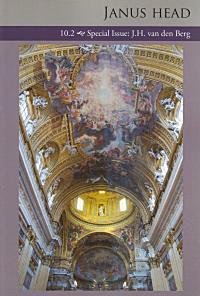 Janus Head Janus Head
10.2
Special Issue
J.H. van den Berg

Travels Inside the Archive
Robert Gibbons
Edge of Maine Editions

Beyond Time
New & Selected Work
1977 - 2007
Robert Gibbons
 The Age of Briggs & Stratton The Age of Briggs & Stratton
Peter Culley
|
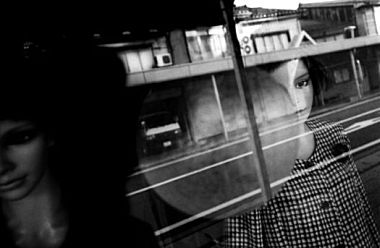
Yasuhiro Ogawa
1 2 3
via Andrew Abb
_______________________
from
“Proem”
Miyazawa Kenji
1896 - 1933
The phenomenon called “I”
is a blue illumination
of the hypothesized, organic alternating current lamp
(a compound of all transparent ghosts)
a blue illumination
of the karmic alternating current lamp
which flickers busily, busily
with landscapes, with everyone
yet remains lit with such assuredness
(the light persists, the lamp lost)
In the twenty-two months, which I perceive
lie in the direction of the past
I have linked these pieces on paper with mineral ink
(they flicker with me,
everyone feels them simultaneously)
each a chain of shadow and light
mental sketches as they are,
which have been kept until now.
quoted by John Latta reviewing Miyazawa Kenji, Selections, edited and with an Introduction by Hiroaki Sato
part of the series Poets for the Millennium, edited by Pierre Joris and Jerome Rothenberg
_______________________

Galina Lukianova
_______________________
It is Night, in My Study
Miguel de Unamuno
Translated by Lillian Jean Stafford and William Stafford
It is night, in my study.
The deepest solitude; I hear the steady
shudder in my breast
--for it feels all alone,
and blanched by my mind--
and I hear my blood
with even murmur
fill up the silence.
You might say the thin stream
falls in the waterclock and fills the bottom.
Here, in the night, all alone, this is my study;
the books don't speak;
...(more)
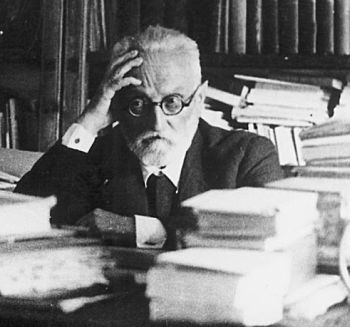
Miguel de Unamuno
b. September 29, 1864
Tragic Sense of Life
_______________________
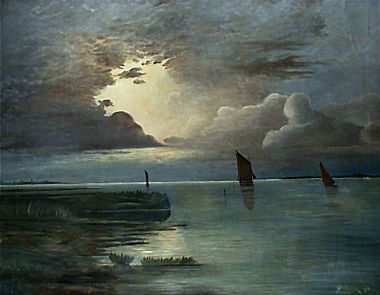
Andreas Achenbach
b. Sept. 29, 1815
_______________________
Beautif: Orpheus after Eurydice
Daniel Tysdal
forget magazine
(....)Looking For: Women; Men; Multiple Patterns; Sirens, don’t bother messaging me first, just call; Maenads and vipers need not respond.
Fantasies: What role-playing scenes do you fantasize about? Gods-gods; Gods-mortals; undead-dead. What location do you fantasize about? That dim and quiet whirl for which all things lovely at last go down. Using the location you chose as the best fantasy setting for a sexual encounter, tell us (in detail) about the encounter. Fact or fantasy? I imagine that Pluto wants another show, Sisyphus hopes to again stand resting with his stone at even my faintest whisper, the dog Cerberus whimpers as at a lick of honey, all that once was scrambles through this underworld, pushing together a reason for me to sing, a figure of pumice before which everything stands in relief. And when I reach this figure, she follows me to the surface of a soil that opens up on sunlight. In fact, I lose her. In fantasy, I lose her too.
Ideal Person: Someone who doesn’t mind if the world is an audience, that any windowsill or petal can praise song’s praises. Someone with a wingspan, olden, available. Someone intersected by the historical details often bypassed by myth. Like when Eurydice died her final death, she spoke to me. She said, “It isn’t your voice alone that makes you beautif”—but when I turned to watch the lives her lips lived through with each syllable I saw her palms letting go “farewell,” ten points of light reflected from fingers tearing from my throat this jumble of dissonant chords....(more)
_______________________
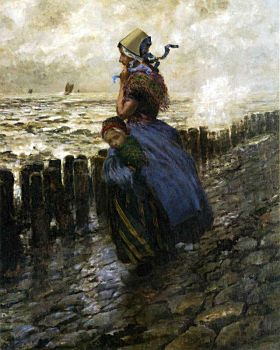
George Hitchcock
b. September 29, 1850
_______________________
The waxwing slain
Seamus Sweeney
nthposition
(....)It's a platitude that one's own voice sounds odd, sounds faintly ridiculous, when heard recorded. My own voice always sounded gloopy and bland to me, but this canon of Waxwings did not sound like my voice. It sounded robotic and musical at once, which was why it took me some time to recognise it as my own. Or, indeed, to recognise the words as my own (as they ostensibly were), although we'll come to that later. Before I can tell you about my life as a literary success, I must tell you about my life as a literary failure.
The history of literature - the movements filled with lofty ideas, the endless manifestos and counter-manifestos, the all-too-serious sense of mission - can be considered a history of envy. Or rather a series of envies - between supposed friends and fellow writers. That has been my experience both as literary failure and success.
Since some stage in mid-adolescence impossible to pin down, I have considered myself a writer. And not just a writer, but an artist. A literary artist. The person who awoke my never-sleeping envy threatened that sense of self; because, at an age when I was still constructing elaborate fantasies of my glorious literary career, he had not only written but published three novels. And he stole my name....(more)
_______________________
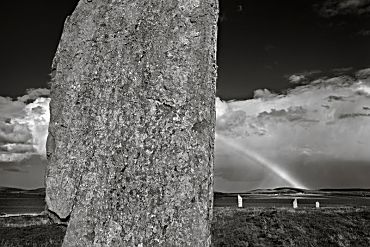
The Ring o' Brodgar
Andrew Ilachinski
Tao of Photography
The Ring of Brodgar, Stenness, Orkney
_______________________
In Medias Res: Five Poems [PDF]
free adaptations of Marguerite Porete
Catherine Daly
entertext
Blind Invocation
Readers, if you want to understand
this book, think about what you will write.
As my senses fail, I am emptied, sight and insight gone
scents and sense, touch and taste, contact and context.
They burned
my books.
I am wayward, I wander. I am absent, and chased. Empty, I
I am leaving.
Readers, think before speaking about this book.
scents and sense, touch and taste, contact and context
They burned
my books.
I am leaving.
scents and sense, touch and taste, contact and context
Translation, Transcreation
Volume 2 number 2 summer 2003
The mirror of simple souls
Marguerite Porete translated by Ellen L. Babinsky
Marguerite Porete /Porette /Marguerite of Hainaut
burned at the stake 1310
The Heresy of the Free Spirit in the Later Middle Ages
Robert E. Lerner
The Trial Of Marguerite Porete (1310)
translated from the Latin by Richard Barton
_______________________
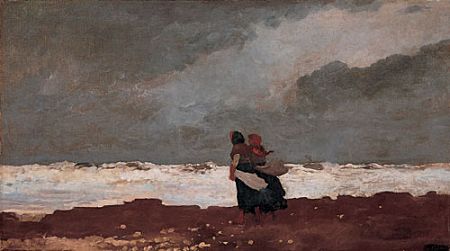 Winslow Homer
d. Sept. 29, 1920
_______________________
Carnivalesque 54
the latest early modern Carnivalesque
_______________________
Happy 13th Artdaily
 wireless fish
photo - mw
_______________________
Brownfield Sonnets
Joyce Peseroff
ploughshares
Winter 2006-07
4. Mist
There’s a place where Shepard River mist
crawls up the shady bank and over the road.
As you step through its otherworldly chill,
the spring-fed stream, rain-flushed, hurries
voices of the dead to Biddeford Pool,
so many notes colliding in one chord,
the pressure hurts your ears. You listen for
your mother’s milk-paint recipe, Dad’s worst
fish story—unsure what the bodiless discuss,
or how. Mosquitoes vibrate from the puddle
in the palm of every leaf, falsetto mob
at your collar crying for blood; you walk
a few feet into sun, where fog transpires
and mud, gumming your instep, cracks to dust.
The Hardness Scale
Joyce Peseroff amazon
Eastern Mountain Time
Joyce Peseroff
amazon
Joyce Peseroff at Ploughshares, AGNI, Memorious and Breakwater Review
_______________________
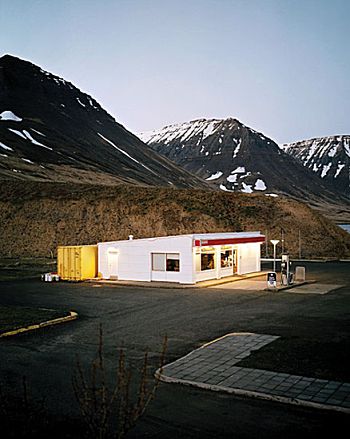
Roots of the Runtur
Rob Hornstra
2004 Hornstra at Flatland Gallery A Conversation with Rob Hornstra
Joerg Colberg
_______________________
Tribe
Edward Dorn
My tribe came from struggling labor
Depression South Eastern Illinois
Just before the southern hills starts
To roll toward the coal country
Where the east/west moranial ridges
Of Wisconsin trash pile up
At the bottom of the prairie, socially
A far Midwest recrudescence of Appalachia
My grandfather French Quebecois
Master pipefitter in the age of steam
Indian fifty percent, very French
Who didn’t derogate himself
As a breed, showed none of those tedious
Tendentious tendencies. Came down
From Chebanse, from the Illinois Central
In Iroquios County, to the Chicago &
Eastern Illinois line’s division at Villa Grove
In one of the Twenties boomlets,
The last precipitous edges of the great devolvement
These forebears on my mother’s side
Owned a nice clapboard house in old town
Where I was brought up off and on during
The intensity of the depression, parents
Wandering work search, up and down
The bleak grit avenues of Flint, following
Other exodus relatives. Belgian in-laws
From another French connexion
Michael Moore-land from the beginning
Manmade poisons in the cattle feed way
Before Creutzfeldt-Jaoob disease and angry cows —
Governments always conspire against
The population and often
This is no even malice;
Just nothing better to do.
I’m with the Kurds and the Serbs and the Iraqis
And every defiant nation this jerk
Ethnic crazy country bombs —
World leaders can claim
What they want about terror,
As they wholesale helicopters
To the torturers —
But I’m straight out
Of my tribe from my great grandma Merton
Pure Kentucky English — it would take more paper
Than I’ll ever have to express how justified I feel.
Ed Dorn and the Public American WestMatthew Cooperman
Now it would take more paper — and more space than this essay affords — to fully unpack the socioeconomic propulsion of this “projective verse,” but its important to note that the poem begins and ends in identity, was written in the flush 90s of identity politics, and yet avoids the essentialism of that stance for a more nuanced sense of how migration was shaped by glaciation, the Depression, ethnicity, the trades, the westward expansion of the railroad. And it carries these facts all the way forward to contemporary Michigan economics, the cattle industry and, most importantly, the war in Iraq. For Dorn’s identity is trans-historical, moves in place and time such that he can identify with “every defiant nation this jerk / Ethnic crazy country bombs.” That we are all ethnic at some remove, and that that remove moves, is the fact of the poem for Dorn. His tribe suffers no tedious tendentious tendencies, no reduction in complexity, even as teleology flings the poem outward into the landscape. ...(more)
.....................................................
Where'd You Get It?
Alice Notley
Where do/ did the words come from? I ask. And open my 1975 edition of Slinger at random, to:
his head is a spasm
of presyntactic metalinguistic urgency
What What What
Where Where Where
Who What Where
What Where Who
I imagine this to be a good description of how Ed began writing Slinger — and how he felt each time he went back to it after a lapse in the writing. However, one thing I notice rereading it is that I find some of my own words and sounds therein (Where’d I get them? Slinger):
Dear lengthening Day
I have loved your apparencies since you created me
I wrote a poem called "Dear Dark Continent" in what had been Ed and Jenny's house in Chicago, at (I think this is the number) 911 West Diversey Street; and a year later, in England, a poem addressed to "Your Dailiness." I wonder if there was a broadside, on the wall of the Diversey Street house, of "The Lawg," which serves as a preface to Book III, The Winterbook. How have I forgotten where my words came from?
In my twenties I seem to have heard Ed read from Slinger in a number of cities: I know I remember New York and San Francisco, but it seems as if there were Chicago and London, I dunno, doano — which spelling suits this ambiance? Slinger is the most physical of poems, despite its purely oxygenated (but knee-slapping) cerebrality; and I associate it with Ed's voice and his reading stance, very straight and tall. There was a lectern in Ed's study, and he wrote standing up. But I can't get this chronology of thirty-some years ago right. Everyone was waiting for what would happen next in the Story; there was an especial suspense as to how it might end — Book IIII: what would it be like? Or rather, would it be as good as its predecessor books? (The pundits finally judged No, but also Yes — Ed had become another person; it was nice that the Slinger said Goodbye, Hasta la Vista — see you later.) It wasn't that there really was a Story — what the hell happens in Slinger? People ride around in a stagecoach or whatever and talk; but there were changes of consciousness between the books, as there were relatively long periods of time between, and there were fabulous word-generated entities talking in the poem, in slant-wise relation to everything that concerned us. The revelation of the new sections was the Story, and the straight-ahead thrust of the line, what it was like when Ed appeared somewhere and read new passages....(more)
In Remembrance of Ed Dorn
Edited by Dale Smith big bridge
For Edward Dorn (II): Wind River Canyon in Snow
Tom Clark
We'd departed Boulder in a false springtime that left us unprepared for the winds and snow we found in Wyoming. The deepening understanding of the meaning of the high plains snow-fence came over us in a rush as the little VW fastback was enveloped in blowing snow. Up in the Wind River Range, not too far from the spot (Titcomb Lakes) pictured in the top photo of the post below, we crossed the Continental Divide in alternating blizzard and blinding sunlight and then again blizzard; the whole scene set into a haze broken with spells of extreme visual acuity; Ed, hunched over the steering wheel like a small-plane pilot over his controls in rough weather, his searching squint into the oncoming flakes contained and keen and penetrant, the white-out a signless opaque cloud gradually enclosing us, wordless, the windows iced, the air frigid, bluish wisps of mushroom smoke drifting like cartoon genies out of Ed's corncob pipe. A wild experience of riding the spine of the Americas at what amounted to an Andean height (well over 10,000 feet, the Wind River Range reaches up near 14,000), well... you had to be there....(more)
Edward Dorn: a world of difference
Tom Clark google books
Edward Dorn: a world of difference
Tom Clark
book depository
_______________________

Village Myths No. 36
Alan Davie
1983
_______________________
Bad History
W. T. Pfefferle
Virginia Quarterly Review
Columbus liked to wear giant plumed hats,
and was fond of a woman he later sold for beads.
The Civil War started sometime in an early morning rain,
and continues to this day.
Nietzsche said that all that glistens is gold.
Chaucer told tales of lovers without conscience.
The houses in heaven have several rooms.
God ran off Lucifer because of my pride.
...(more)
via riley dog
_______________________
 Alan Davie
b. Sept. 28, 1920
Davie in his studio
Photo: Iain Roy
1993
1 2
_______________________
"To be sure, I wanted to 'work in philosophy,' but what could that mean outside of a purely pedagogical activity or the vanity of fabricating books?"
- Levinas
Towards an Ethical Literary Criticism: the Lessons of Levinas
Markus Poetzsch Antigonish Review # 158
The title of this paper represents an attempt to grapple with this idea of becoming, to outline a critical perspective that reconnects the critic as writer in a meaningful way with his/her audience. If criticism has any hope of becoming, it must reconsider, or rather, reconfigure this fundamental relationship. A meaningful reconfiguration, as I would like to suggest, must begin by refining and narrowing the idea of audience even more radically than it is constituted at present, not in terms of an expected readership over time but rather in terms of how the book will be read at any given moment in time - what in the language of Georges Poulet is called the phenomenology of reading. Put simply, the audience of a work of literary criticism does not consist of prospective publishers, editorial boards or a coterie of subject specialists; it consists, fundamentally, of a single individual who, whenever and wherever the opportunity presents itself, sits down and opens the book. Notwithstanding the innovations and interventions of technology, that is still the irreducible experience of reading; it is an intimate, albeit entirely impersonal, meeting of an author's words and a reading subject, what Poulet, adopting the language of the French rationalists, refers to as the cogito. If critics were to boil their diffuse and vague notions of readership down to this - the audience as cogito - then something might very well change in how they engage that audience. For with this radical reconfiguration of the writer-reader relationship, this distillation to intimacy, one is ineluctably pulled from critical irresponsibility to what, in Levinas's terms, is the very core of ethical responsibility: the relationship not merely between writer and reader, but between Self and Other. As he suggests in Ethics and Infinity, "[t]he irreducible and ultimate experience of relationship appears to me…in the face to face of humans, in sociality, in its moral signification". The fact that he offers this reflection in the context of a face-to-face encounter with his interviewer, Phillipe Nemo, might well lead one to contend that reading is a rather more isolating and solipsistic process than an interview, that, if anything, it perpetually defers the face-to-face of writer and reader through the very medium of language. Yet as Levinas's work elsewhere on the subject of the ethical exigency of the face-to-face makes clear, particularly in Totality and Infinity, the face is properly conceived not as a visual construct but as a discursive one. It is through discourse, not vision, that one establishes a relation with the Other that preserves his/her otherness. Vision envelops and subsumes, but language, as Levinas reminds us, is at all times "a relation between separated terms" . The ethical relationship with the Other is therefore founded on discourse and experienced as "response or responsibility" (Levinas 88)....(more)
Ethics and Infinity: Conversations with Philippe Nemo Emmanuel Levinas book depository link
_______________________
Economies of Affectivity
Juan Martín Prada
...it seems inevitable to validate Giorgio Agamben's claim that the concept of life should constitute the object of the philosophy to come.
It is certainly obvious that the most industrialised societies have reached the full stage of consolidation of this process in which the zoé (bare life) will gradually merge with the field of the political (although this process is actually more likely to have occurred inversely). The diagnosis posed by Michel Foucault in the seventies regarding the concept of biopower is obvious today. It is evident that power has taken intense control over life, it is exercised at the level of life, losing almost all its autonomy and transcendence, the exteriority it used to have from its field of application, now acting from inside life, regulating it from the inside, an integral part of it. And if power is not exercised on individuals, but rather if it moves around them (we all make it move, at varying degrees of consciousness), it seems logical that the most efficient dispositifs in the exercise of power can no longer be unilateral or permanent, but rather participative, adaptive and reversible.
Thus, more than through the exercise of traditional political sovereignty, power acts by producing and extending ways of living, ways of enjoying and experiencing life. Therefore, biopower should be understood to mean much more than power over bodies, much more than technologies to control the biological or physical life of the population. In short, almost all politics today are biopolitics, because practically all of the political and economic strategies now focus on life and the living ( whereas this term does not refer only to the biological, but to the wider, vital sphere)....(more)
_______________________
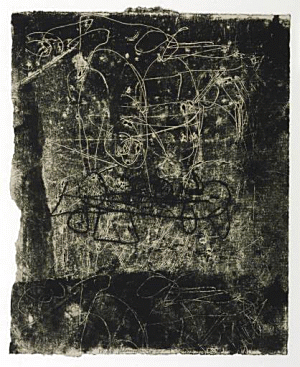
Night Sky on a Holiday
Alan Davie
1948
_______________________
Whiteness As Property
Cheryl I. Harris
The Social Science Research Network Electronic Paper Collection
Abstract:
Issues regarding race and racial identity as well as questions pertaining to property rights and ownership have been prominent in much public discourse in the United States. In this article, Professor Harris contributes to this discussion by positing that racial identity and property are deeply interrelated concepts. Professor Harris examines how whiteness, initially constructed as a form of racial identity, evolved into a form of property, historically and presently acknowledged and protected in American law. Professor Harris traces the origins of whiteness as property in the parallel systems of domination of Black and Native American peoples out of which were created racially contingent forms of property and property rights. Following the period of slavery and conquest, whiteness became the basis of racialized privilege - a type of status in which white racial identity provided the basis for allocating societal benefits both private and public in character. These arrangements were ratified and legitimated in law as a type of status property. Even as legal segregation was overturned, whiteness as property continued to serve as a barrier to effective change as the system of racial classification operated to protect entrenched power.
Next, Professor Harris examines how the concept of whiteness as property persists in current perceptions of racial identity, in the law's misperception of group identity and in the Court's reasoning and decisions in the arena of affirmative action. Professor Harris concludes by arguing that distortions in affirmative action doctrine can only be addressed by confronting and exposing the property interest in whiteness and by acknowledging the distributive justification and function of affirmative action as central to that task.
Social Science Research Network
_______________________
Eliminationism in America
Dave Neiwert
ten-part series
orcinus
_______________________
Glenn Beck is the future of literary fiction
Steve Almond
A handful of right-wing bestsellers have recast mundane cultural dislocation into riveting epics of paranoia
Take the Obama Conspiracy-Theory Challenge!
Leslie Savan
It takes a lively paranoia, a financial stake, and/or a belief that a black man has no right to order white folks around to come up with such outlandish fabrications. But if any of you can tap your inner John Bircher, please share your crazed thoughts: What will be the right's next big Obama conspiracy theory?
Right-Wing Hatemongering Fueled by Christianity?
Frank Schaeffer
The Obama Haters
We still don't understand how fringe conservatism went mainstream.
David Greenberg
Republican Gomorrah:
Inside The Movement That Shattered The Party
Max Blumenthal
book depository link
Republican Gomorrah
reviewed by Jane Smiley
Six Questions With Scott Horton of Harper’s on “Republican Gomorrah”
The Nightmare of Christianity
Max Blumenthal
_______________________
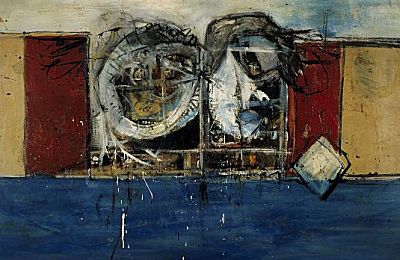
Seascape Erotic
Alan Davie
1955
_______________________
The Siblings' Watch
Viktor Ivaniv
Translated from the Russian by Peter Golub
words without borders
He walked, a flame before him,
It seemed to have appeared behind one shoulder, then the other,
There were not many people, there was no sun, before the demolition
Of the house they stood the day before Pokrov,
Sent circles out
And came forth from the Earth
Before the face of those left without a roof.
Last time they crossed by paths made up of smoke
From house to house, to sit in attic windows
Knee deep in shit, around the corners inaccessible by Earth,
With one's own bottom feel the cooling of the roofs,
And see the incandescent lamps in the pale rooms,
And spit upon the neighbors from above.
...(more)
_______________________
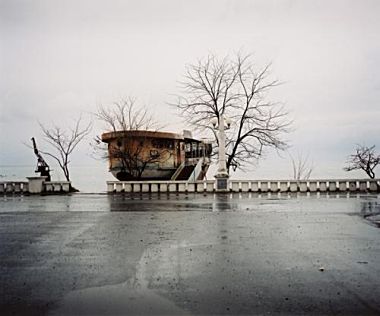
Café/Bar Mars
Sukhumi, Abkhazia
Rob Hornstra
2007
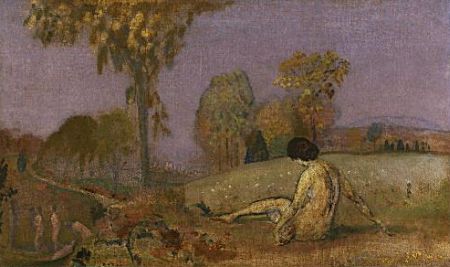
Autumn
Enchanted Salutation
1907
Arthur Bowen Davies
b. Sept. 26, 1863 _______________________
The melancholy year is dead with rain.
Drop after drop on every branch pursues.
From far away beyond the drizzled flues
A twilight saddens to the window pane.
And dimly thro' the chambers of the brain,
From place to place and gently touching, moves
My one and irrecoverable love's
Dear and lost shape one other time again.
So in the last of autumn for a day
Summer or summer's memory returns.
So in a mountain desolation burns
Some rich belated flower, and with the gray
Sick weather, in the world of rotting ferns
From out the dreadful stones it dies away.
- Trumbull Stickney
_______________________
Let It Go
It is this deep blankness is the real thing strange.
The more things happen to you the more you can't
Tell or remember even what they were.
The contradictions cover such a range.
The talk would talk and go so far aslant.
You don't want madhouse and the whole thing there.
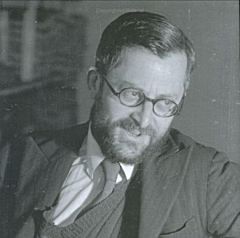
William Empson
27 September 1906 - 15 April 1984
The feeling that life is essentially inadequate to the human spirit, and yet that a good life must avoid saying so, is naturally at home with most versions of pastoral; in pastoral you take a limited life and pretend it is the full and normal one, and a suggestion that one must do this with all life, because the normal is itself limited, is easily put into the trick though not necessary to its power. Conversely any expression of the idea that all life is limited may be regarded as only a trick of pastoral, perhaps chiefly intended to hold all our attention and sympathy for some limited life, though again this is not necessary to it either on grounds of truth or beauty; in fact the suggestion of pastoral may be only a protection for the idea which must at last be taken alone.
-
William Empson, from "They That Have Power" in Some Versions of Pastoral
Seven Types Of Ambiguity William Empson (1949) Open Archive
Essays on Shakespeare
William Empson
google books
Selected letters of William Empson
google books .....................................................
William Empson: Against the Christians
John Haffenden
google books
William Empson: prophet against sacrifice
Paul H. Fry
google books
The critic as poet: Empson's contradictions
Paul Dean
New Criterion, Oct, 2001
William Empson: the critical achievement
edited by Christopher Norris, Nigel Mapp
google books
_______________________
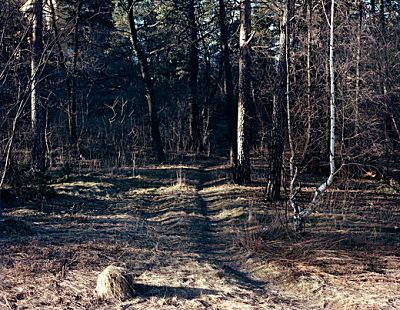
Short Cuts
Johan Bergström
_______________________
Mnemosyne
Trumbull Stickney
It 's autumn in the country I remember.
How warm a wind blew here about the ways!
And shadows on the hillside lay to slumber
During the long sun-sweetened summer-days.
It's cold abroad the country I remember.
The swallows veering skimmed the golden grain
At midday with a wing aslant and limber;
And yellow cattle browsed upon the plain.
It 's empty down the country I remember.
I had a sister lovely in my sight:
Her hair was dark, her eyes were very sombre;
We sang together in the woods at night.
It 's lonely in the country I remember.
The babble of our children fills my ears,
And on our hearth I stare the perished ember
To flames that show all starry thro' my tears.
It 's dark about the country I remember.
There are the mountains where I lived. The path
Is slushed with cattle-tracks and fallen timber,
The stumps are twisted by the tempests' wrath.
But that I knew these places are my own,
I 'd ask how came such wretchedness to cumber
The earth, and I to people it alone.
It rains across the country I remember.
_______________________

blue devils
George Cruikshank
(27 September 1792 – 1 February 1878)
_______________________
Scanners, collectors and aggregators.
On the ‘underground movement’ of (pirated) theory text sharing
Janneke Adema
open reflections
... it is not only the lack of fear of possible retaliations that is feeding the upsurge of text sharing communities. There is a strong ideological commitment to the inherent good of these developments, and a moral and political strive towards institutional and societal change when it comes to knowledge production and dissemination.(....)
What is clear is that the text sharing network described above (I am sure there are many more related to other fields and subjects) is also formed and maintained by the fact that the blogs and resource sites link to each other in their blog rolls, which is what in the end makes up the network of text sharing, only enhanced by RSS feeds and Twitter accounts, holding together direct communication streams with the rest of the community. That there has not been one major platform or aggregation site linking them together and uploading all the texts is logical if we take into account the text sharing history described before and this can thus be seen as a clear tactic: it is fear, fear for what happened to textz.com and fear for the issue of scale and fear of no longer operating at the borders, on the outside or at the fringes. Because a larger scale means they might really get noticed. The idea of secrecy and exclusivity which makes for the idea of the underground is very practically combined with the idea that in this way the texts are available in a multitude of places and can thus not be withdrawn or disappear so easily.
This is the paradox of the underground: staying small means not being noticed (widely), but will mean being able to exist for probably an extended period of time. Becoming (too) big will mean reaching more people and spreading the texts further into society, however it will also probably mean being noticed as a treat, as a ‘network of text-piracy’. The true strategy is to retain this balance of openly dispersed subversivity....(more)
.....................................................
Pirate Philosophy
Culture Machine
Tenth Anniversary Issue, edited by Gary Hall
_______________________
The Philosophy of Restoration - Alain Badiou and the Enemies of May
Nina Power and Alberto Toscano
Scribd
via infinite thØught
_______________________
Digitalizing Historical Consciousness
Claudio Fogu
History and Theory
abstract
What is a “historical” video game, let alone a successful one? It is difficult to answer this question because all our definitions of history have been constructed in a linear-narrative cultural context that is currently being challenged and in large part displaced by digital media, especially video games. I therefore consider this question from the point of view of historical semantics and in relation to the impact of digital technology on all aspects of the historiographical operation, from the establishment of digital archives, to the production of e-texts, to the digital remediation of visual modes of historical representation. Seen from this dual perspective, video games appear to participate in a process of spatialization and virtualization of historical semantics.
_______________________
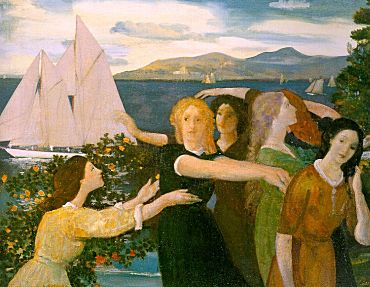 across the harbor
Arthur Bowen Davies
_______________________
Today & Yesterday
Robert Gibbons
Saturday, September 19, 2009
Time reaching so far in the clouds north & wide at the horizon east & back down archaeologically to imagined breath in marks & traces of this wheeling earth. See & feel centuries in what pure air pours forth today. Pick up a discarded book from the art school library for two bucks with Classic Etruscan reproductions, including the Caeretan hydria, a large two-handled water jar from 540-520 B.C. At this point in history, the history I can see & feel in what pure air pours forth today, Europa is summering in Crete. Four days before the Equinox Zeus is a streamlined black bull with handsome Europa, once seduced, now enthused to build the Palace of Minos. What intrigues me most, as a man standing here in northern climes seeing & feeling Time & history & imagined breaths in what pure air pours forth today are the Mediterranean fish & dolphins & nymphs with laurel wreaths accompanying the couple. The bull is a large as she is beautiful. The marriage of cultures in Time is what I see & feel in what pure air pours forth today.
Robert Gibbons Log
_______________________
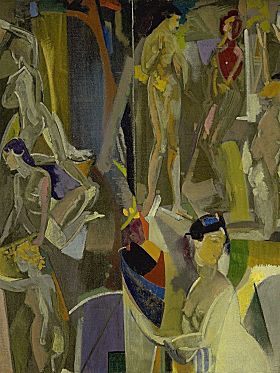
Dust Of Color
(ca. 1915-1920)
Arthur Bowen Davies

Subway Scene
Mark Rothko
1938
_______________________
Media Dopplers
Chad Scoville
ctheory
In September of 2008, the failure of a principal American financial institution coincident with the seizing of international credit markets inaugurated the transition between the information and outformation age. An international common hallucination, triggered by a mediated spectre of unprecedented computational gaming and media visuality. The event ritualized the information deaths of millions of workers, globally, orbitally, and geosynchronously constituting the machinations of an economic matrix already functioning in a perceptive frame traveling at speeds beyond human interactivity.
The record of spacetime on earth skipped, officiating the violent acceleration of outformative economics; bots proxying bots, scanning market data and executing decisions at nanoscales. Jim Cramer, 'Fast Money', CNBC, and Bloomberg are light paintings, dramatized media dopplers created by the outformation construct acting to further connect away from the meatspace realm of human consciousness. It is itself, the outformation construct, talking to itself. (....)
The network is the ritual. It is the bitwise ayahuasca spectre of outformation. It disassembles centuries of social order and anthropogenic methods of engagement. It is materially paraphrased by the incessant and rampant generative character of what could be described as the second order or second tier information complex. These are classified as the derivatives of first order information, content, and as coefficients of outformation. These variables exist as metrics potentiating the critical path of futurity. (....)
The failure of politics as the protector of the common good of society is due to its inability to sustain its discourse on par with the features and functionality of outformation.(....)
The notion of the proprietary crumbles obliquely in the presence of the network ritual. In meatspace, the body is a topology unto itself, its forms and processes unique as organic chains of amino acids and lipids reconstruct themselves into a firmament duplication unto the magnetic impulse of the earthen ley grids. The network violently obliterates propriety with extreme prejudice. In the sense of the media doppler, the infinite cloning loop of extraneated superspace, informatic control mechanisms bot themselves towards complete urbanity of virtualism; sheer numbers and processor cycles outnumber the meastspace desire for culpability, compliance, and legality. The copies outnumber the originals. This is why the battery for economics lies in the illusion of liquidity as algorithmic trade executors ramp up trading volumes on dark pools fictionalizing exchange in the sense that it is just computers talking to each other to procure more silicon....(more)
_______________________
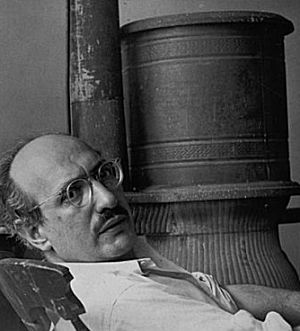
Mark Rothko
Sept. 25, 1903 – Feb. 25, 1970
photo - Henry Elkan
1954
"It was with the utmost reluctance that I found the figure could not serve my purposes....But a time came when none of us could use the figure without mutilating it."
-
Mark Rothko
_______________________
from
"And the One Doesn't Stir without the Other" [pdf]
Luce Irigaray
Translated by Hélène Vivienne Wenzel
Signs, Vol. 7, No. 1 (Autumn, 1981), pp. 60-67
With your milk, Mother, I swallowed ice. And here I am now, my insides frozen. And I walk with even more difficulty than you do, and I move even less. You flowed into me, and that hot liquid became poison, paralyzing me. My blood no longer circulates to my feet or my hands, or as far as my head. It is immobilized, thickened by the cold. Obstructed by icy chunks which resist its flow. My blood coagulates, remains in and near my heart.
And I can no longer race toward what I love. And the more I love, the more I become captive, held back by a weightiness that immobilizes me. And I grow angry, I struggle, I scream-I want out of this prison. But what prison? Where am I cloistered? I see nothing confining me. The prison is within myself, and it is I who am its captive. How to get out? And why am I thus detained?(....)
You look at yourself in the mirror. And already you see your own mother there. And soon your daughter, a mother. Between the two, what are you? What space is yours alone? In what frame must you contain yourself? And how to let your face show through, beyond all the masks?
It's evening. As you're alone, as you've no more image to maintain or impose, you strip off your disguises. You take off your face of a mother's daughter, of a daughter's mother. You lose your mirror reflection. You thaw. You melt. You flow out of your self.
But no one is there to gather you up, and nothing stops this overflow. Before day's end you'll no longer exist if this hemorrhaging continues. Not even a photographic remembrance as a mark of your passage between your mother and your daughter. And, maybe, nothing at all. Your function remains faceless. Nourishing takes place before there are any images.3 There's just a pause: the time for the one to become the other. Consuming comes before any vision of her who gives herself. You've disappeared, unperceived-imperceptible if not for this flow that fills up to the edge. That enters the other in the container of her skin. That penetrates and occupies the container until it takes away all possible space from both the one and the other, removes every interval between the one and the other. Until there is only this liquid that flows from the one into the other, and that is nameless. _______________________
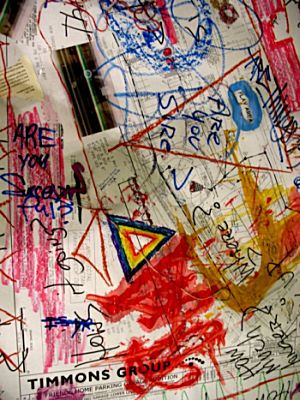
collab fest 29
an exhibit of works by poet, essayist, photographer, mail artist, editor and publisher tom taylor, who passed away last week after a long battle with cancer. the exhibit will stay up for two weeks.photos by sue leftwich, jim leftwich, and ralph eaton.
_______________________
a clean well-lighted place for books
Bob Stein
future of the book
The purpose of this new set of notes is to expand the thinking beyond how a specific text is presented or interacted with. Reading (and writing) do not happen only at the level of the individual work. There is a broad ecology of behaviors, activities and micro-environments that surround each work and our relationship to it -- how things come to be written, how we choose what to read, how we make the purchase, how we share our experience with others. Currently (i.e. toward the end of age of print), that ecology is defined by agent/editor mechanisms of acquisition, sharp delineation between authors and readers, top-down marketing, heavy reliance on big mainstream media to get the word out, the bookshelves that make our books part of our daily life, bookstores and -- yes -- Amazon. Much more than not, Amazon is a product of the same DNA that underlies the still-dominant mode of the print-book read by the solitary reader. Everything about the Kindle, from its interaction design to its draconian DRM provisions, underlines its conservative role in preserving the ecologies of print.
The current e-book business (the buying/selling bits) was designed (or at least evolved) to minimize friction with the legacy business; pricing, release schedules and DRM all structured so as not to challenge print, which is still the predominant source of revenues.
To succeed at publishing in the networked era, it won't be enough just to re-conceive the work as a "networked book." If we accept that social interaction will be paramount, not just at the level of the individual work but throughout the ecology of networked reading and writing, then it's important also to ask the question "if a book is a place, what is the place for books? (or, more accurately but less forceful, "what are the places for books?")
Currently the predominant place(s) for books are bookstores, libraries, classrooms, cafes (as a stand-in for the general category of informal brick-and-mortar gathering places), living-room reading groups, and the infoweb (mainstream media + internet) where books are reviewed, promoted, and on sites like LibraryThing and Shelfari, discussed. Each of these places has its own culture, its own social fabric that determines how people relate to each other, what their transactions are like, how you meet "new" people, how you come to trust them or not, and how you manage ongoing connections/relationships....(more)
_______________________
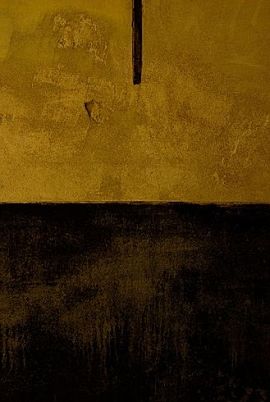
Mark Rothko
_______________________
from
Beyond Another Ocean
Notes By C. Pacheco
Fernando Pessoa
Translated by Chris Daniels
fascicle
(....)
When I feel isolated the need to be any person arises
And eddies around me in oscillating spirals
This way of saying is not figurative
And I know that it eddies around me like a moth around a light
In it I see symptoms of weariness and am horrified when I think it will fall
But as this never quite succeeds, it happens at times when I am isolated
There are those who are affected by scratchings on the walls
And others who are not affected
But scratchings on walls are always the same
And the difference comes from the persons. But if there is a difference within this sensing
There will have to be personal difference in the sensing of other things
And when all think the same of a thing it is because it is different for each one
Memory is the faculty by which we know that we must live
And therefore amnesiacs cannot know that they live
But like me they are unhappy and I know that I am living and that I must live
An object that is attained, a fear one has
Are all manners of being alive for others
I would like to live or to be within myself as spaces are or live
After eating so many persons sit in rocking chairs
They arrange themselves on the cushions close their eyes and allow themselves to live
There is no struggle between living and the will not to live
Or else — and this is horrid to me — if there really is a struggle
They kill themselves with a pistol shot having first written letters
To abandon oneself to living is as absurd as speaking in secret
...(more)
Chris Daniels at Shearsman Press
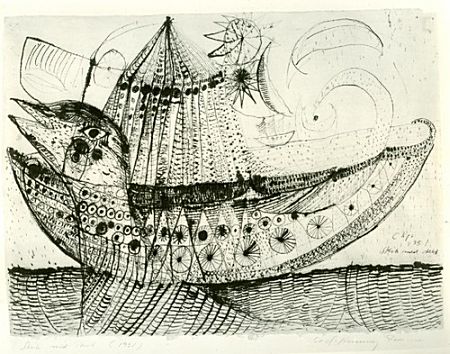
Ship with Tent
1951
Carl-Henning Pedersen
b. Sept. 23, 1913
1 2 3
_______________________
Walked into state
office building
in flat white
light of cold overcast that,
without sun,
makes all days
seem alike--boat adrift on
ocean sans shore
floats aimless
on endless waves
falling and
again lifting.
- Tom Clark
.....................................................
There are a lot of blogs that publish the poetry of the blog owner, but virtually none of the others are by Tom Clark, a man who has been a master of the post-avant lyric for some four decades that I can remember. And if these are mostly current work – they’re mostly not dated unlike, say, much of Larry Eigner’s verse – it represents an intense outpouring at a time in one’s life when many other poets have tended to drift off into silence. Without even getting into the fact that Clark’s the first NY School poet of his generation to make great use of the web (he’s also a major contributor to the Vanitasblog), it’s well worth checking out at least once a week.
- Ron Silliman
Tom Clark: Beyond the Pale
Tom also posts at Vanitas
_______________________
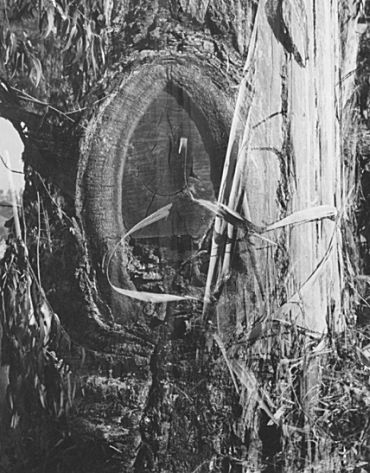
Confusion in the Forest
ca. 1948
Works by Imogen Cunningham
G. Gibsons Gallery
via 1 2
_______________________
Toward A Provisional Definition Of Disequilibrium
Chris Martin
exquisite corpse
Equilibrium denotes a still point. Disequilibrium necessitates a forward movement, an inertia, the future becoming the present, perpetually in process.
Equilibrium is a provisional and abstract structure, a falsification of the real that serves the world of appearance. The falsity of equilibrium is the dissimulation of peace. Everywhere, this false peace paradoxically threatens to obliterate bodies: real bodies, ontological bodies, bodies in the midst of becoming.
Instead: no peace, no balance, no stillness, no silence—in effect, no nothing. What is is. Or, more accurately, what is is becoming.
Disequilibrium is the shape of this becoming: forward yet oblique, inexorable yet unpredictable, invisible yet visceral, destructive yet creative. Contradiction is not prohibited, it is inherent. This is Nietzsche’s affirmation: Everything is permitted! There is no dialectic, no parallel opposition—all is asymmetrical. Disequilibrium is a field of movement where interpenetrations flourish, vectors verge, and coincidence induces the situation of becoming to the sense-world of the body.
Though disequilibrium perpetually recurs, forever overspilling only to return, it has nothing to do with circles. The middle is a zone of veers, of unpredictable lurches and zags that never look back. Truth looks only backwards, whereas the real—disequilibrium—is forever facing forwards; not simply facing, but barreling, headlong, never straight but always oblique.
No balance, no right angles, no parallel lines, no circles—in effect, no geometry.
Think breath: an inexorable process of regeneration, repetitive yet variable—you breathe and in breathing change, you live and you die, asymmetrically.
Think blood: a ceaseless journey, always forwards but with tiny backwaters—the blood is the medium of the body, its middle ground, it preserves and is replaced, the body and the blood, cell by cell, mutually mutating.
Equilibrium is dependent on sight. Seeing separates, punctuates, isolates, inculcates, abbreviates, obliterates. Seeing creates a form built on edges, a violence of exactness, a knife sense. Equilibrium is impossible without the abstraction of the eye, which cuts at a distance.
Disequilibrium is dependent on nothing short of existence. It privileges touch, the haptic, modes of feeling over modes of seeing. More than touch even it privileges the synesthetic. Disequilibrium incorporates. Disequilibrium interpenetrates. It acts with intimacy, proximity, responsibility.
No hierarchy, only movement. Only becoming. Only of.
(....)
We are compulsively ordering the world. It is a matter of aesthetics. It is a matter of choices that have been subsumed by a system of aesthetics so successful that we don't even know it exists. It is Debord’s spectacle, but a specific version of it, much older than the postmodern world. Merleau-Ponty suggests the term “reflective order.” Regardless of what we call it, it is a system predicated on the eradication of bodies. Consider disorder. In this system a disordered part disorders the whole. If we judge a part of the body as disordered, we judge the whole body as disordered. More than that, we judge the whole person as disordered. At any node on the spectrum, the key fact is that we judge. Again, it's a matter of aesthetics. Disordered parts may include race, class, weight, gait, or any of a myriad of factors. What unites them is our desire to isolate and eradicate them.
Where does this desire come from? A fiction. The oldest, most powerful, and most dangerous fiction. That one is separate. When do we learn this fiction? At the exact point we learn fiction. This happens twice. Once in a fire and once in a mirror. Then it keeps happening. Let’s start in the middle. The mirror. ...(more) _______________________
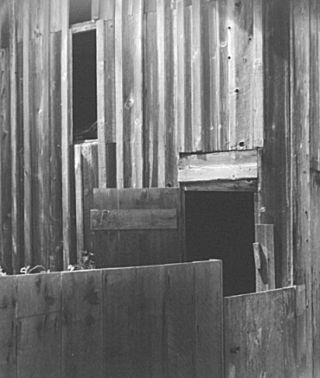
Division of Space
ca. 1948
Imogen Cunningham
_______________________
Composition as Explanation [pdf]
Gertrude Stein
1926
No one is ahead of his time, it is only that the particular variety of creating his time is the one that his contemporaries who also are creating their own time refuse to accept. And they refuse to accept it for a very simple reason and that is that they do not have to accept it for any reason. They themselves that is everybody in their entering the modern composition and they do enter it, if they do not enter it they are not so to speak in it they are out of it and so they do enter it; but in as you may say the non-competitive efforts where if you are not in it nothing is lost except nothing at all except what is not had, there are naturally all the refusals, and the things refused are only important if unexpectedly somebody happens to need them.
(....)
The time of the composition is the time of the composition. It has been at times a present thing it has been at times a past thing it has been at times a future thing it has been at times an endeavour at parts or all of these things. In my beginning it was a continuous present a beginning again and again and again and again, it ’was a series it was a list it was a similarity and everything different it was a distribution and an equilibration. That is all of the time some of the time of the composition.
Now there is still something else the time-sense in the composition. This is what is always a fear a doubt and a judgement and a conviction. The quality in the creation of expression the quality in a composition that makes it go dead just after it has been made is very troublesome.
The time in the composition is a thing that is very troublesome. If the time in the composition is very troublesome it is because there must even if there is no time at all in the composition there must be time in the composition which is in its quality of distribution and equilibration. In the beginning there was the time in the composition that naturally was in the composition but time in the composition comes now and this is what is now troubling every one the time in the composition is now a part of distribution and equilibration. In the beginning there was confusion there was a continuous present and later there was romanticism which was not a confusion but an extrication and now there is either succeeding or failing there must be distribution and equilibration there must be time that is distributed and equilibrated. This is the thing that is at present the most troubling and if there is the time that is at present the most troublesome the time-sense that is at present the most troubling is the thing that makes the present the most troubling. There is at present there is distribution, by this I mean expression and time, and in this way at present composition is time that is the reason that at present the time-sense is troubling that is the reason why at present the time-sense in the composition is the composition that is making what there is in composition.
And afterwards.
Now that is all.
_______________________
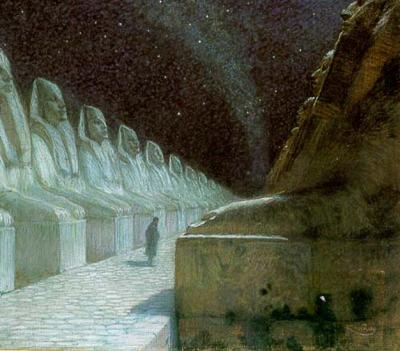
The Way of Silence
František Kupka
b. Sept. 23, 1871 185 images
_______________________
There Is Ignorant Silence in the Center of Things
William Bronk
(....)
Hopeless. Off in the distance, busyness.
Something building or coming down. Cries.
Clamor. Fuss at the edges. What? Here,
at the center — it is the center? — only the sound
of silence, that mocking sound. Awful. Once,
before this, I stood in an actual ruin, a street
no longer a street, in a town no longer a town,
and felt the central, strong suck of it, not
understanding what I felt: the heart of things.
This nothing. This full silence. To not know.
...more courtesy of waggish
_______________________
 Paul Delvaux
b. Sept. 23, 1897
99 images
.....................................................
Words in the Paintings of Paul Delvaux
David Scott
Abstract: In Delvaux's paintings, the word or fragment of text brings with it a feeling of the uncanny that signals the return of an obsession or a repressed memory. In pictorial terms, Delvaux's concern with the return of hidden or buried elements of human experience is shown in the evocation of images revealing the deeper structure either of the human body or of visible reality. This deconstructive tendency also extends to the conventions of visual representation. So, Delvaux's pictures show a deep concern for perspective, for pictorial verisimilitude and the accurate presentation of details, an obsession also apparent in the play of mirror reflections, framing and optical devices. This paper shows how these preoccupations expressing the artist's anxiety in the face of reality, and its pictorial representation, are also revealed by the insertion of words into his paintings....(more)
Image [&] Narrative13. The Forgotten Surrealists: Belgian Surrealism Since 1924
_______________________
Art and Research
a journal of ideas, contexts and methods
Volume 2. No. 2.
A Gathering of Artistic Research: From New Science to Nameless Science
“We must say, then, that the poets were the sense of mankind, and the philosophers its intellect. Thus, what Aristotle said in particular about the individual is also true in general about humankind: ‘Nothing is found in the intellect which was not first found in the senses’, Nihil est in intellectu quin prius fuerit in sensu. This means that the human mind can only understand a thing after the senses have furnished an impression of it, which is what today’s metaphysicians call an occasion. For the mind uses the intellect whenever it ‘gathers’ something insensible from a sense impression, and this act of gathering is the proper meaning of the Latin verb intelligere, to understand.” (Vico, New Science)
This issue of Art & Research represents a ‘gathering’ of issues and experiences in artistic research as manifest in papers and artworks presented on the ‘occasion’ of significant international conferences and symposia dedicated to artistic research held between May and December 2008...
_______________________
Mechanism of Utopia [pdf]
E. M. Cioran
Translated by Richard Howard
Grand Street, Vol. 6, No. 3 (Spring, 1987), pp. 83-97
When Christ promised that the "kingdom of God" was neither "here" nor "there," but within us, he doomed in advance the utopian constructions for which any "kingdom" is necessarily exterior, with no relation to our inmost self or our individual salvation. So deeply have utopias marked us that it is from outside, from the course of events or from the progress of collectivities, that we await our deliverance. Thus was devised the Meaning of history, whose vogue would supplant that of Progress, without adding anything new to it. Yet it was necessary to shelve not a concept, but one of its verbal translations, which had been abused. In ideological matters, we are not easily renewed without the help of synonyms. _______________________
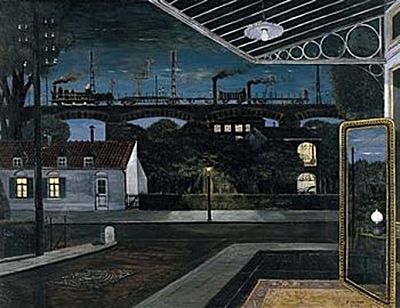
The Viaduct
1963
Paul Delvaux
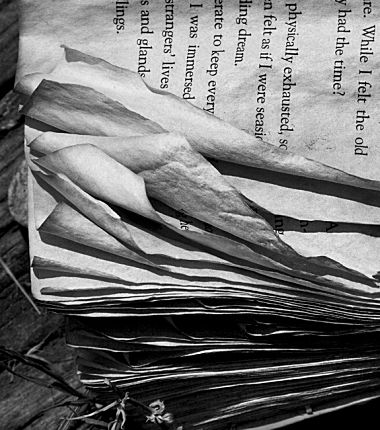 Book Pages
San Rafael
2008
Robert Hecht A Moment's Notice:
Photographs by Robert Hecht
Soulcatcher Studio
_______________________
How is Literature Possible?
Maurice Blanchot
Why this fear of commonplaces? It is because, according to terrorist critics, cliches are a sign of laziness and inertia. The writer who takes refuge in them revels in a kind of indolence which subordinates him to ready-made forms. He still believes he is thinking for himself; this is his mistake. He accepts a succession of words which imposes a fixed order upon him and narrowly confines his thought. The use of commonplace expressions thus leads to a serious abuse, which is verbalism. The author who is a victim of conventional sentences is no longer in control of what he is saying. And his words, triumphing over the exact meaning to which they ought to correspond, rebel against the mind which attempts to guide them, weigh upon it with all of their brute force, and make it aware of how degradingly all-powerful that force is. If we reflect on certain words, such as freedom, democracy, order, and on the disorderliness that can result if they are used carelessly, it becomes clear to us that writers have good reason to be vigilant in preventing a facile subservience. Apparendy given over to licence and anarchy, they are in fact engaged in repudiating chance, darkness, confusion, destroying idols and battling with monsters. Terror, in brief, as the enemy of commonplaces and rules, is engaged in a fight against a sickness of language, and in the fear that words, left to themselves and freed from their meaning, might exert over the minds and hearts of men a formidable power, this terror attempts to restore to inspiration and creative force a boundless empire. Jean Paulhan notes that this conception has found in Bergson's philosophy the privileged doctrine which has led it to self-awareness. Following Bergson's advice, it has invited writers continually to resist practical, ordinary language in order to rediscover the fluid forms of a deeper life. It goes beyond apparent logic, fixed by everyday words, in search of an unexpressed and probably inexpressible reality; it strives to break the network of conventions in order to get through to a world that is still innocent; it lays claim to a virginal contact, to brand-new meanings, finding within this aspiration towards an extreme purity the justification for the imperious decrees which cause it to regard with suspicion the savoir-faire and technique proper to all usages of language.
This then is terror, its claims, its hates, its secrets. What are we to think of it? If we look a little more carefully at its grievances, we notice first of all that they don't correspond to the simplest observations and then that they are based on a remarkable kind of illusion. It would be rash to believe that the use of commonplace expressions always presumes laziness or leads to verbalism.
The Blanchot Reader
Edited by Michael Hollan
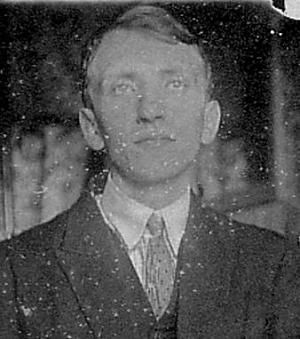
Maurice Blanchot
(September 22, 1907 – February 20, 2003)
The image is intimate. For it makes of our intimacy an exterior power which we suffer passively. Outside of us, in the ebb of the world which it causes, there trails, like glistening debris, the utmost depth of our passions.
-
Maurice Blanchot
When The Time Comes
Maurice Blanchot
translated by Lydia Davis
The Last Man
Maurice Blanchot
Translated by Lydia Davis
ubu editions
The Space of Literature [pdf]
Maurice Blanchot
translated by Ann Smock
_______________________
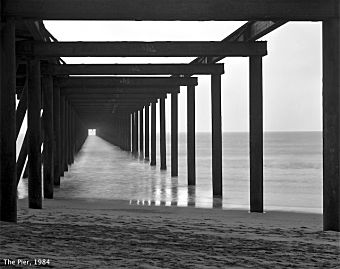
Pier
Robert Hecht
_______________________
Blanchot, The Obscure
Colloquy
Issue Ten, November 2005
Monash University
Without Maurice Blanchot (1907-2003): Readings In Memoriam
Audio (87 min) at Slought Foundation
Maurice Blanchot: the demand of writing
edited by Carolyn Bailey Gill
google books including: Simon Critchley on Blanchot's "Il y a"; Rodolfe Gasche on the "Null Space of Literature"; Gillian Rose on death; a previously unpublished letter by Blanchot explaining his political position in the 1930s; Jeffrey Mehlman's "Pour Sainte Beuve" and Roger Laporte on Blanchot today. The Demand of Writing [pdf]
The space opened by Blanchot
Pierre Joris
What Blanchot gave me was a space to think experience in and to experience thinking in; to think the book in, to think writing in as a self-reflexive meditation in movement. His writing did this: the way the sentences thought themselves forward, drawing the reader in, raising in him a lucid exaltation and a calm tension, in their promise that something would be discovered in the process of reading. All one had to do was to immerse oneself into the act of reading/thinking, to become the sentence unfolding under eye and in brain, to follow its course as it dis-coursed, dis-covering its own thought-meander, while thinking through another writer. Reading Blanchot was an invitation into the space of witnessing the momentous event of the experience of thought. It was the gift of the closest of alliances where one became the included third actively witnessing, i.e. having to think through the thinking through of the work of another thinker/writer —without this writing ever becoming “literary criticism,” but always existing in/as the very act of writerly writing.
The space opened thus opened the very possibility of the work I wanted to do. ...(more)
.....................................................
Common Presence: Blanchot at 100
spurious Blanchot's concern with language as the 'outside' remembers an experience of language over which the 'I' has no power. Sometimes, Blanchot presents it as a kind of silence, but this should not be understood too quickly: gaps in language are readily assimilable by the common order of sense. Silence stands in for an interruption of language as it is experience in the absence of the form of the subject. This may seem absurd, since the position of the 'I', the subject, is presupposed in all speech and writing. But the Blanchotian subject is unstable; it does not come to itself once and for all, but can break down, its power scattering like sand, like J.'s pulse in Death Sentence. And so with the experience of the outside, where what is reached is the hither side of language, language unsubordinated to the intentions of anyone.
This is not mysticism. The experience of language as the outside is perfectly ordinary, says Blanchot; it is the way we live the everyday and the idle chatter that fill it. Heidegger has a horror of Das Man, the anyone in particular whose willingness to talk about everything endlessly distracts it from struggling to lay claim to its own existence. But to pass the word along, gossiping about this and that is to experience language as it is disowns any particular existence, in a manner exactly analogous to those elected to undergo reading and writing in the way Blanchot describes. ...(more)
Much more spurious on Blanchot .....................................................
Two essays on Blanchot
Charlotte Mandell
Ellipsis
Poetry and the Experience of Language after Heidegger, Holderlin and Blanchot
William S Allen
Maurice Blanchot: The Refusal of Philosophy
Gerald L. Bruns
google books
Textual Communities: Nancy, Blanchot, Derrida
Kuisma Korhonen
culture machine
The Movement of Testimony:
Suffering and Speech in Blanchot and Antelme
Lars Iyer
The Unbearable Trauma and Witnessing in Blanchot and Levinas [PDF]
Lars Iyer
janus head
_______________________

Reflections
Luxembourg Gardens
1999
Robert Hecht
_______________________
The Open Space Project
This year, FLEFF institutes the OPEN SPACE PROJECT, a series of user generated online events exploring all the definitions, topographies, cartographies, places, ideas, concepts, and actions that help us understand open space. The Open Space Project runs from September 2009 to June 2010. Each project will roll out consecutively over the next nine months. The Map Open Space Project is on-going, with no deadlines.
Open Space
A Year-Long Nomadic Exploration Finger Lakes Environmental Film Festival Ithaca College
via Ulises Mejias
_______________________
A Speculative Heresy/ The Inhumanities cross-blog event!
_______________________
Underground Berlin: the film treatment
Lebbeus Woods
What follows is a treatment (Hollywood slang for story synopsis) with sketches that I made for a projected film in which new forms of architecture—and the way of living they enable—would play a central role. This followed hard on the heels of my experience as a “conceptual architect” for the big-budget movie Alien3. Working on that project, I realized that set designers have no power over how their designs are used, and certainly no influence on the story or its social or ethical implications. So, I decided to write a screenplay that—contained in a melodrama—would project architecture as a vital instrument of social change....(more)
_______________________

The Lament for Icarus
Herbert Draper
1863-1920
_______________________
from “Primitive State”
Anselm Berrigan
The debates were complacent on the matter of widespread coexistence.
Then this dog puppet gets up in my face.
Combing over the polaroids of drug lords to get acquainted.
She thinks it's funny to put things she finds on the floor in her mouth.
Venom and anti-venom being aspects of a costume prone to occasional reanimation.
Impressed by the substance of our debt we watched it crawl all day long among the empties. Flagon, barium, perimeter, deep vandalism, excavation precepts, cruelty-free fallacy, the cordial affect of the tick, coloring books digesting their young, and a gefelte fish were what I brought.
Looking for that angle from which it looks good....(more)
Sous RatureSummer/Fall 2009
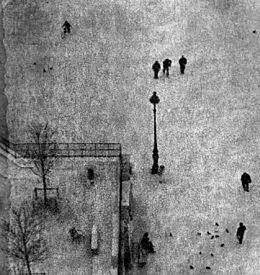
Donata Wenders
via Bent at Ordinary finds
_______________________
Ah we're lonely, we're romantic
and the cider's laced with acid
and the Holy Spirit's crying, "Where's the beef?"
And the moon is swimming naked
and the summer night is fragrant
with a mighty expectation of relief
So we struggle and we stagger
down the snakes and up the ladder
to the tower where the blessed hours chime
and I swear it happened just like this:
a sigh, a cry, a hungry kiss
the Gates of Love they budged an inch
I can't say much has happened since
but CLOSING TIME
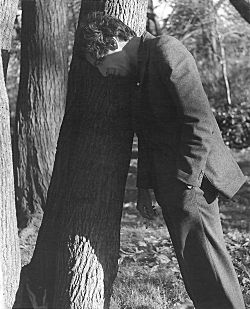
Leonard Cohen
b. Sept. 21, 1934
photo: David Boswell
The Leonard Cohen Files
Ring the bells that still can ring
Forget your perfect offering
There is a crack in everything
That's how the light gets in.
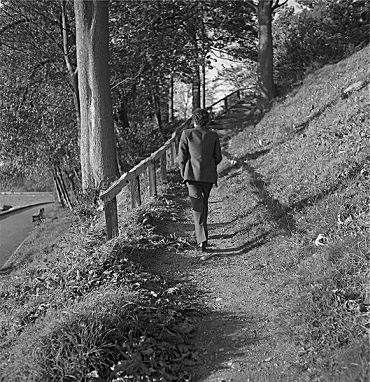
Leonard Cohen
Vancouver, B.C.
1978
photo: David Boswell
_______________________
Jacques Rancière on The Ignorant Schoolmaster: Five Lessons in Intellectual Emancipation
Emancipation does not hinge on the power of words as such. It hinges on the power of the relation with the book. The materiality of the book is opposed to the position of the master; the book is in your hands, and nobody is there to tell you how you have to understand words. There is the possibility of a lot of translations being made by the reader so that, in a certain way, it is the reader who transforms the book. And even if you put the words in a certain order to convey a certain meaning, and even if words are overdetermined, it’s up to the reader to change the rules of the game. This is the first point.
The second point is that I used a strange idiom in this book, an idiom in between the language of Jacotot and the language of our contemporaries. The language of Jacotot is not the one used today to discuss issues of education. His lexicon is not the lexicon that is now used. There is a kind of linguistic strangeness in my book that makes it very difficult to read. Readers have to do something; they have to muddle through a kind of strangeness. These are not the words that are usually used for speaking about matters of education and politics. On the one hand, I bridged the two languages and the two epochs. But, on the other hand, I wanted to keep that strangeness, to throw a strange object into the middle of the debate in France between the sociological view of education and the view of education that says that it is knowledge that emancipates; I threw into the debate this object with both its intellectual and linguistic strangeness. Initially, the book was not read at all by professors. It was read mostly by social workers, artists, and psychoanalysts. Academics read it only ten or twenty years after it was written, which means precisely that it demanded a different treatment. The book was addressed to people who try to find not a new doctrine but a new way of dealing with words—with words and meanings.
in Aesthetics against Incarnation: An Interview with Anne Marie Oliver available in a bundle - Jacques Rancière Essay Collection
aaaarg Rancière's The Ignorant Schoolmaster is available as a mediafire download
_______________________
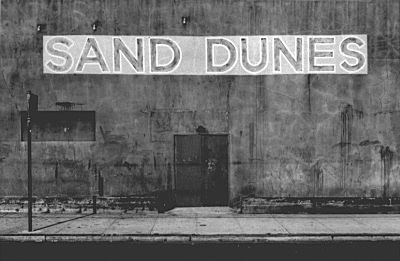
Lewis Baltz
Photography is a Political Technology of the Gaze
Interview with Lewis Baltz
(1993)
americansuburbx
_______________________
Yes, 'respectable' Republicans, you do have reason to worry
David Neiwert
It seems respectable Republicans who like to think of themselves as "intellectual" conservatives are growing dismayed at the living, breathing monster they themselves have unleashed upon us(....)
getting unentwined from the liked of WorldNetDaily and its extremist clientele is easier said than done.
No, the right-wing populist beast is loose. You fellas have the right idea, but you're a bit late. We're already well into the great thrashing about that comes with any set of death throes, such as those now besetting movement conservatism. You can see how it plays out on the ground now, particularly at the Tea Parties. And it isn't pretty....(more)
_______________________
Look, a village can not reorganize village life to suit the village idiot. It’s as simple as that and we have to understand we have a village idiot in this country, it’s called fundamentalist Christianity and until we move past these people and let me add as a former life long Republican, until the Republican leadership has the guts to stand up and say it would be better not to have a Republican Party than have a party that caters to the village idiot there’s going to be no end in sight.
The next thing they’ll do is accuse Obama of being the Antichrist and then who knows what comes next, on and on it goes. There is no end to this stuff. Why? Because this subculture has as its fundamentalist faith that they distrust facts per se. They believe in a young Earth, 6000 years old, with dinosaurs cavorting with human beings. They think whether it’s economic news or news from the Middle East it all has to do with the end of time and Christ’s return.
This is la-la land and the Republican party is totally enthralled to this sub-culture to the extent that there is no Republican Party. There is a fundamentalist sub-culture that has become a cult, it’s fed red meat by buffoons such as Rush Limbaugh, Glenn Beck and other people who are not terribly bright themselves and are talking to even stupider people. That’s where we’re at.
- Frank Schaeffer
_______________________
Scholars note the tendency of polling firms to “socially construct” public opinion by refusing to ask questions about Americans’ moral challenges to U.S. foreign policy. Benjamin Ginsberg argues in The Captive Public that “polls generally raise questions that are of interest to clients and purchasers of poll data - newspapers, political candidates, governmental agencies, and business corporations…questions of no immediate relevance to government, business, or politicians will not easily find their way into the surveys. This is particularly true of issues such as the validity of the capitalist economic system, or the legitimacy of governmental authority, issues that business and government prefer not to see raised at all, much less at their own expense.”
- Antony Dimaggio
_______________________
Four Poems
Lisa Samuels
how2
Social sculpture
Lisa Samuels
These appear the sun and boys and boys
their tan applications no hit but awful – these voices
so arrayed from ruination given to
a loftness or arising a blue
windmill lilting and not here
turning lot given a red way to say
‘They feed themselves with suspicions’
‘I think they are nominal and preventive’
No one dies for venture it’s all ‘duree’
she said with a dying voice the pieces of
your ideas taste stubby and sad about that
your brown hair falls swept back
your posture looks upright and lovely
They don’t actually investigate
it’s more like the serene face of the smiling
film-goddess harkening to partiality
she’s gone and here the same
vitality due to form
starter options finer than the face given to view
a domino effect – the body folds along its seams
and she is telling it increasingly rapids the bright water
falling across the fine green of her legs
she felt and the water gave a sense
we associate with men who leave dead
on the alternate wire that cuts through day
a point of view for the sake of energy procured.
a grace, hogwash, ratiocination, bodily projection,
a grey bonsai off an absent
flat small quantified.
Lisa Samuels at the Electronic Poetry Center
An Interview with Lisa Samuels on Laura Riding and Poetry (Part 1) and Part 2
Waggish
.....................................................
Anarchism is not enough
Laura Riding
Edited and with an introduction by Lisa Samuels
google books
_______________________
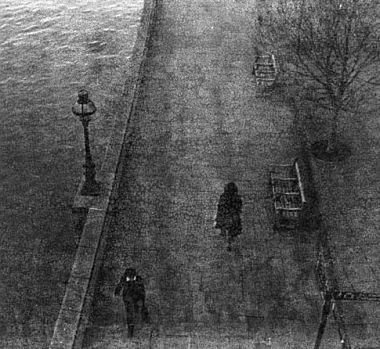
Donata Wenders
_______________________
Ultimate Death
Evgeny Baratynsky
translation by Peter France
There is a way of being; but how can I
describe it? It is neither sleep, nor waking;
somewhere between the two, we walk the line
that separates insanity from reason.
Our mind is fully in control,
but at the same time we see visions roll –
each wilder, more capricious than the last –
from every side upon our heads, as if
we were abandoned to the elements
that rage across our long-lost native land;
but sometimes, under the influence of dreams,
we see a light that others cannot see.
Was it the fiction of a feverish dream
or the creation of my reckless mind,
this vision that rose up before my eyes
in the black depths of night? I cannot say,
but at that time I seemed to see revealed
what was to come in future years, events
ascended into air, developing
and shifting like the clouds, and whole epochs
from time to time lay open to my sight,
and finally I saw without a veil
the ultimate fate of everything alive.
...(more)
Two poems by Evgeny Baratynsky
parallel translation from Russian by Peter France
The International Literary QuarterlyIssue 8
_______________________
Annual Review Of Critical Psychology 7 (2009)
Lacan and Critical Psychology
via Philosophy's Other
_______________________
Aether: The Journal of Media Geography
via Anne Galloway
_______________________
Félix Guattari: Thought, Friendship, and Visionary Cartography
Franco Berardi
_______________________

Marius Borgeaud
b. 21 Sep. 21, 1861

Rene Taze Atelier III
Erik Desmazières
1 2
The art of Erik Desmazières
John Coulthart
{ feuilleton } Erik Desmazières at Giornale Nuovo
_______________________
Pedagogy of the Oppressed
Paulo Freire
The central problem is this: How can the oppressed, as divided, unauthentic beings, participate in developing the pedagogy of their liberation? Only as they discover themselves to be “hosts” of the oppressor can they contribute to the midwifery of their liberating pedagogy. As long as they live in the duality in which to be is to be like, and to be like is to be like the oppressor, this contribution is impossible. The pedagogy of the oppressed is an instrument for their critical discovery that both they and their oppressors are manifestations of dehumanization.
Liberation is thus a childbirth, and a painful one. The man or woman who emerges is a new person, viable only as the oppressor-oppressed contradiction is superseded by the humanization of all people. Or to put it another way the solution of this contradiction is born in the labor which brings into the world this new being: no longer oppressor nor longer oppressed, but human in the process of achieving freedom.
This solution cannot be achieved in idealistic terms. In order for the oppressed to be able to wage the struggle for their liberation they must perceive the reality of oppression not as a closed world from which there is no exit, but as a limiting situation which they can transform. This perception is a necessary but not a sufficient condition for liberation; it must become the motivating force for liberating action. Nor does the discovery by the oppressed that they exist in dialectical relationship to the oppressor, as his antithesis that without them the oppressor could not exist — in itself constitute liberation. The oppressed can overcome the contradiction in which they are caught only when this perception enlists them in the struggle to free themselves.
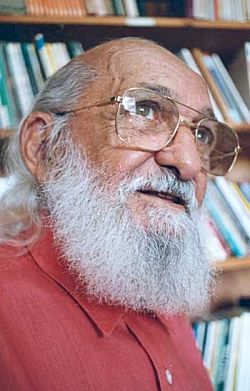
Paulo Freire
September 19, 1921 - May 2, 1997
Pedagogy of the oppressed
Paulo Freire
translated by Myra Bergman Ramosgoogle books
Pedagogy of hope: reliving Pedagogy of the oppressed
Paulo Freire
translated by Robert R. Barr
google books
We make the road by walking: conversations on education and social change
Myles Horton, Paulo Freire
google books
Pedagogy of freedom: ethics, democracy, and civic courage
Paulo Freire
translated by Partrick Clarke
google books
The Politics of Education
Culture Power and Liberation
Paulo Freire
translated by Donaldo Macedo
google books
Paulo Freire
A Critical Encounter
ed. by Peter McLaren & Peter Leonard
google books
Paulo Freire and informal education
Mark K. Smith
The uncomfortable responsibility to problematise progressive thinking
By John Wallis
The new world order continues to reproduce inequality and oppression with little evidence of abatement. It is argued here that although history may have called into being new relations at both the global and personal levels those questions of fundamental value that Freire poses remain the same and the demands on the educator do not change in essence. In line with Freire's own thought the future will reproduce itself in different forms and ideologies will adjust accordingly, but the demands on the educator remain. The demand here is that we recognise the essence of a critical education and while maybe seeking greater educational opportunities for the deprived we do not lose ourselves in demands for more established "education" and battles for wider participation - in other words - lapse into the alimentary form of education that Freire critiques. The challenges to us remain the same and although the surface features of reality may change the dialectical forces producing the oppression we purport to oppose remain in rude health....(more)
Freire Online
_______________________
fragment of a manifesto for a radical pedagogy
blah-feme
What we must no forget
• We must never forget that the process of teaching is performative: to know this is to refuse to succumb to the seductive charm of the guru position......(more)
_______________________
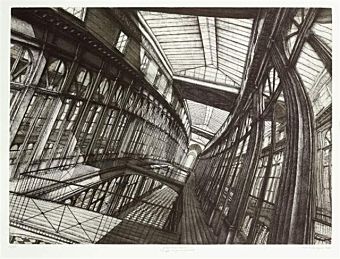
Erik Desmazières
_______________________
The Airy Christ
Stevie Smith
After reading Dr Rieu’s translation of St Mark’s Gospel.
Who is this that comes in splendour, coming from the blazing East?
This is he we had not thought of, this is he the airy Christ.
Airy, in an airy manner in an airy parkland walking,
Others take him by the hand, lead him, do the talking.
But the Form, the airy One, frowns an airy frown,
What they say he knows must be, but he looks aloofly down,
Looks aloofly at his feet, looks aloofly at his hands,
Knows they must, as prophets say, nailèd be to wooden bands.
As he knows the words he sings, that he sings so happily
Must be changed to working laws, yet sings he ceaselessly.
Those who truly hear the voice, the words, the happy song,
Never shall need working laws to keep from doing wrong.
Deaf men will pretend sometimes they hear the song, the words,
And make excuse to sin extremely; this will be absurd.
Heed it not. Whatever foolish men may do the song is cried
For those who hear, and the sweet singer does not care that he was crucified.
For he does not wish that men should love him more than anything
Because he died; he only wishes they would hear him sing.
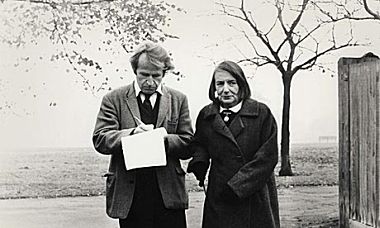
Stevie Smith
(20 September 1902 – 7 March 1971)
John Gale interviews Stevie Smith
1969
Photograph: Jane Bown
Collected poems
Stevie Smith
google books
Faith in a "Watching Brief"
Stevie Smith and the Religion of Facism
in
Women's fiction of the Second World War: gender, power and resistance
Gill Plain
google books
Stevie Smith: Girl, Interrupted
Jessica Walsh
Papers on Language and Literature, Winter 2004
_______________________
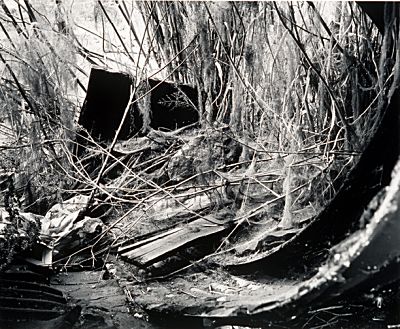
Lewis Baltz
George Eastman House
_______________________
Alone in the Woods
Stevie Smith
Alone in the woods I felt
The bitter hostility of the sky and the trees
Nature has taught her creatures to hate
Man that fusses and fumes
Unquiet man
As the sap rises in the trees
As the sap paints the trees a violent green
So rises the wrath of Nature’s creatures
At man
So paints the face of Nature a violent green.
Nature is sick at man
Sick at his fuss and fume
Sick at his agonies
Sick at his gaudy mind
That drives his body
Ever more quickly
More and more
In the wrong direction.
_______________________
I would like to swim against the stream of time: I would like to erase the consequences of certain events and restore an initial condition. But every moment of my life brings with it an accumulation of new facts and each of these new facts brings with it its consequences; so the more I seek to return to the zero moment from which I set out, the further I move away from it; though all my actions are bent on erasing the consequences of previous actions and though I manage to achieve appreciable results in this erasure, enough to open my heart to hopes of immediate relief, I must, however, bear in mind that my every move to erase previous events provokes a rain of new events, which complicate the situation worse than before and which I will then, in their turn, have to try to erase. Therefore I must calculate carefully every move so as to achieve the maximum of erasure with the minimum of recomplication.
-
Italo Calvino, If on a winter's night a traveler
_______________________

Lewis Baltz
_______________________
Right and Wrong Political Uses of Literature
Italo Calvino
Context
Literature is necessary to politics above all when it gives a voice to whatever is without a voice, when it gives a name to what as yet has no name, especially to what the language of politics excludes or attempts to exclude. I mean aspects, situations, and languages both of the outer and of the inner world, the tendencies repressed both in individuals and in society. Literature is like an ear that can hear things beyond the understanding of the language of politics; it is like an eye that can see beyond the color spectrum perceived by politics. Simply because of the solitary individualism of his work, the writer may happen to explore areas that no one has explored before, within himself or outside, and to make discoveries that sooner or later turn out to be vital areas of collective awareness.
This is still a very indirect, undeliberate, and fortuitous use for literature. The writer follows his own road, and chance or social and psychological factors lead him to discover something that may become important for political and social action as well. It is the responsibility of the sociopolitical observer not to leave anything to chance, and to apply his own method to the business of literature in such a way as not to allow anything to escape him.(...)
...if it is impossible today for anyone to feel innocent, if in whatever we do or say we can discover a hidden motive--that of a white man, or a male, or the possessor of a certain income, or a member of a given economic system, or a sufferer from a certain neurosis--this should not induce in us either a universal sense of guilt or an attitude of universal accusation.
When we become aware of our disease or of our hidden motives, we have already begun to get the better of them. What matters is the way in which we accept our motives and live through the ensuing crisis. This is the only chance we have of becoming different from the way we are--that is, the only way of starting to invent a new way of being....(more)
_______________________

Anechoic Chamber
Lewis Baltz
_______________________
They came running over the perilous sands
Children with their golden eyes
Crying: Look! We have found samphire
Holding out their bone-ridden hands.
It might have been the spittle of wrens
Or the silver nest of a squirrel
For I was invested with the darkness
Of an ancient quarrel whose omens
Lay scatter’d on the silted beach.
The children came running toward me
But I saw only the waves behind them
Cold, salt and disastrous
Lift their black banners and break
Endlessly, without resurrection.
Herbert Read, 1945
Herbert Read Reassessed
Edited by David Goodway google books
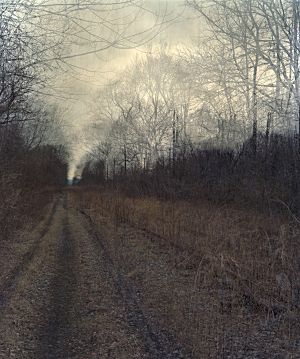
Time Travelling
Bryan Graf
via We Can't Paint Blog
_______________________
"There isn´t anything anywhere any more"
An interview with László Krasznahorkai
Hungarian Literature Online
I often go into exile wherever I can, from America to East Asia, just to make sure I am not here. Literally, I will go anywhere just to make sure I don't have to be at home. Of course, the end result is that when I go to a place like this, I usually return shattered, disappointed, and disillusioned. Because there is no place on earth from which a guy like me would not return shattered, disappointed, and disillusioned. What is worse, it means that our yearnings have no meaning anymore. Bit by bit, after many years of unwilling wanderings, I am getting to be convinced there is no place worth yearning for. There isn't anything anywhere anymore. So there is a negative attraction at home and a positive push of repulsion abroad. I am not saying that the past is brilliant – the recent past, for instance, almost killed me. But those people, living under oppression, had that something about them that gave you hope that the democratic ideals we envisaged at the time could build us a country which is more tolerable when measured by the moral and aesthetic expectations we held. But let me repeat – I would in no way like to idealise what we had at the time. How could I? I would much rather say that we have now lost by the wayside even what little we had – all that once prevented people from becoming blinded by their situation. We have lost whatever used to stop people from selling their dignity for a spoonful of gold or a spoonful of free soup – whatever they have in their spoons. ...(more)
El último Lobo
László Krasznahorkai
Translated from the Hungarian by George Szirtes words without borders
Dumb to the Deaf
László Krasznahorkai
Translated by Eszter Molnár
Gone Berserk in Paradise [pdf]
(Notes on the Aesthetics of Total Culture in Japan)
László Krasznahorkai
War and war
László Krasznahorkai
translated by George Szirtes
google books
The Melancholy of Resistance
László Krasznahorkai
translated by Georges Szirtes
google books
(An excerpt from the first chapter of the novel)
Hungarian Quarterly,
comment by Waggish
That traditionalism, that reference to the "ancestral laws of the soul" which supposedly keep us all in line and prevent the fall into chaos--that is the voice of fear for me. I used to think that this was indicative of a somewhat conservative tendency in Krasznahorkai, a willingness to accept the strictures of fate out of the worry that challenging them would bring down the weight and fury of the heavens. Now it seems more like a description of some lurking death-instinct, an atavistic tendency that represents something like Moosbrugger did in The Man Without Qualities, except generated in the angst and neurosis of people's minds, a product of the flaws of order that are built into the systems that emerge: more of a biological process than a political one, the inevitable appearance of the imp of the perverse, the worm in the apple....(more)
The Imp Of The Perverse
Edgar Allan Poe _______________________
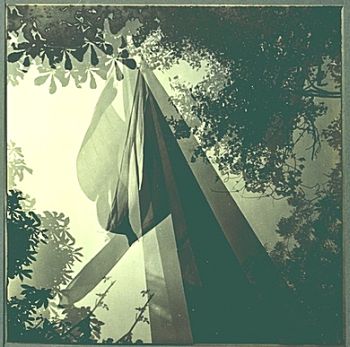 Multiple exposure - partially solarized
ca. 1925
Francis Bruguière
(1879-1945)
_______________________
Peril
Anne Carson
vaguen
(Samuel Beckett, notation on MS of Happy Days)
I
Fire comes bouncing in from the
desert a threat to houses Here’s
what we do says the King to
Rudyard Kipling who is visiting
Stuff wet rags in the eaves throw
the silverware in the swimming
pool And my letters Rudyard
Kipling is thinking will you be
pressing my letters to your
breast as we skid towards
the car Truly diverse people
the King and Kipling one or
the other was always getting
his feelings hurt Above them
a strip of once blue sky now
dark adust
II
Nowadays there are technicians
of despair you can work at it
Going to the Buddhist study
group I pass a thin crumpled
man at a wall his face on the
bricks Behind him another big
black city legs wide apart roaring
Say you aren’t stupid then why
aren’t you happy
...(more)
The Threepenny Review
Issue 119, Fall 2009
Anne Carson at The Poetry Foundation_______________________
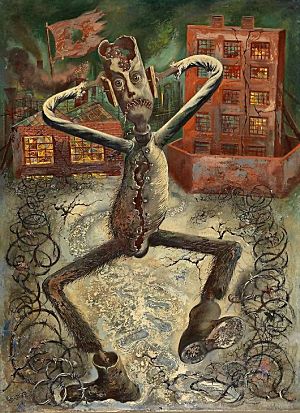
The Grey Man Dances
1949
George Grosz - The Years in America
1933-1958
David Nolan Gallery
via
_______________________
It’s self-evident that a movement that calls the president a lying, socialist, Nazi eugenicist with a fake birth certificate is about something more than deficit spending. People don’t brandish automatic weapons and pray for the president’s death because they want to keep their employer-sponsored health plans. But to name the stalking beast is more than we can bear.
Not, thankfully, for Carter. He knows the tea-baggers aren’t new, that their fear of “big government” is but the latest version of states’ rights, which was itself a pseudonym for white supremacy. And he wants us to recall this history:
-
Kai Wright
_______________________
Eroticizing Marx, Revolutionizing
Freud: [pdf]
Marcuse's Psychoanalytic Turn
Jeffry V. Ocay
Contrary to what Marx predicted, however, Marcuse realized that the transition from capitalism to socialism did not happen. What happened instead were the integration of the proletariat into the status quo, the stabilization of capitalism, the bureaucratization of socialism (as in the case of the former Soviet Union), and the absence of a revolutionary agent for progressive social change. Marcuse saw that the capitalist society had developed a technique that effectively dissolves “opposition” in the society and reduces the individuals into acquiescence or even complicity. The result is obvious for Marcuse: a conformist society. This explains why Marcuse attempted to complement his revitalization of Marxism with Freud. Marcuse’s attempt to revitalize Marxism through Heidegger and Hegel, therefore, does not suffice. It needs another decisive piece to complete the methodological puzzle: Freud’s psychoanalysis.
This is the main thrust of this essay—an engagement on how Marcuse attempted to provide Marxism its anthropological basis by going into the depth dimension of the human psyche, by appropriating Freud’s theory of instincts. Thus, an eroticized Marx and a revolutionized Freud ensued. Marcuse’s intention here is clear: to explain why the transition from capitalism to socialism did not happen, why, especially in the 1930s, the revolutionary class had been dissolved and became conformist, and also how this conformism was even extended in the post-war era.8 In his engagement with Freud’s theory of instincts, Marcuse also intends to explicate his second notion of liberation, an attempt which he vigorously grapples with throughout his lifetime. The discussion that follows centers on Marcuse’s 1950s work, which he considers to be his magnum opus: Eros and Civilization.
KRITIKE 3.1 (2009)
_______________________
'Godot is here':
how Samuel Beckett and Vaclav Havel changed history
Samuel Beckett wrote a play for Václav Havel when he was in jail. On being freed, Havel returned the favour. It was the making of a great dramatic double-act
Jo Glanville
"The fact that Samuel Beckett made himself heard in this way pleased me immensely," recalls Havel. "He was a father of modern theatre, who dwelt somewhere up in the heavens, isolated from the hubbub down below." When Havel was released the following year, he returned the honour by dedicating a play, Mistake, to Beckett. It's a little-known footnote to both writers' careers. The plays were performed together in Stockholm in 1983 and first published in 1984 by the magazine Index on Censorship. Tomorrow, to mark the 20th anniversary of the fall of communism in eastern Europe, IoC is presenting a rare performance of the two works, at the Free Word festival in London....(more)
via Rhys Tranter
_______________________

Fisher Library
Philadelphia
Candida Höfer
_______________________
Benjamin Now: Critical Encounters With The Arcades Project
(2003)
pdf available at aaaarg
free reg. req.
Philip Rosen, “Introduction”
T.J. Clark, “Should Benjamin Have Read Marx?.
Samuel Weber, “ ‘Streets, Squares, Theaters’: A City on the Move—Walter Benjamin’s Paris”
Howard Eiland, “Reception in Distraction”
Peter Fenves, “Of Philosophical Style—from Leibniz to Benjamin”
Michael Jennings, “On the Banks of a New Lethe: Commodification and Experience in Benjamin’s Baudelaire Book”
Tom Gunning, “The Exterior as Intérieur: Benjamin’s Optical Detective”
Peter Wollen, “The Concept of Fashion in The Arcades Project”
Claudia Brodsky Lacour, “Architectural History: Benjamin and Hölderlin”
Henry Sussman, “Between the Registers: The Allegory of Space in Walter Benjamin’s Arcades Project”
Kevin McLaughlin, “Benjamin Now: Afterthoughts on The Arcades Project”
Lindsay Waters, “Come Softly, Darling, Hear What I Say: Listening in a State of Distraction—A Tribute to the Work of Walter Benjamin, Elvis Presley, and Robert Christgau”
_______________________
Space in Theory - Kristeva, Foucault, Deleuze
Russell West-Pavlov
aaaarg
"Far from being a neutral void in which objects are placed and events happen, space/ing becomes a medium with its own consistency and, above all, its own productive agency. This book aims to offer an introduction to the role of space in three important French thinkers who regarded space as being the actively productive condition of social significance rather than merely the invisible, transparent receptacle for events, objects, and meanings."
_______________________

photo - mw

The Open Door
Plate VI
The Pencil of Nature
William Henry Fox Talbot
c. 1844 The Pencil of Nature
William Henry Fox Talbot
London: 1844
Glasgow University Library
_______________________
Listening with Courtesy
A Conversation with Tim Lilburn
Studies in Canadian Literature
DW Is "seeing with courtesy" a way to truth?
TL It is truth. The thing is more than your name for it and more than your ability to know it. It's more magnificent to you than your imagination of your advantage. It's just broader in so many ways so that approaching it -- the river, the hills, the deer, anything -- you are tempted to simply give up in front of it. But if you don't give up, can't do this, say, the thing has about it a kind of distance. Its sheer distance is a kind of violence; it thwarts what you pride most in yourself, your ability to comprehend, your ability to draw things toward you through language. All of these powers are humiliated as you approach the differentiated thing. And out of this humiliation comes courtesy. You are forced to give the thing back to itself and your ability to encase, hold, draw toward you, domesticate, is shaped; it is bent back on itself. So whether you put the thing down, letting go along with it a sense of yourself as central, or you have it torn out of your hand, you lose it. Eros is wooed by the thing and it hurtles forward; and wrapped around eros is language, comprehension, sense of order. Desire seems to be shaped by its own momentum and velocity, and as it moves along it just loses these very things, language and so on, by which you thought it was constituted. Language, order, are stripped and impoverished by the wonderful distance of a thing in the world, as I say in one of the poems in Moosewood Sandhills, "Desire will be broken and will continue with a bright limp" [from "Restoration"]. I think that a sort of way-station for desire fairly well along into the erotic enterprise is humiliation, the sense of being impoverished. You may even welcome this sense, and this is the root of courtesy, a response to the oddness and distance of things. (...)
... If you listen to a piece of music several times, part of your hearing is a sense of what will come next; so the shape, you are sure, to fulfill itself, will move in this direction. I think a lot of people feel that the shape, or spirit of the age we're living in, will next move to here: to compunction, to apology, tears, sorrow. This is what we're bending towards.
DW For what are we apologizing?
TL All of these imperialisms that we've engaged in. This foolish sense that we were and are entitled in an unlimited way....(more)
Tourist to ecstasy Tim Lilburn
Tim Lilburn google books
Orphic politics: poems
Tim Lilburn
google books
_______________________
Jim Carroll: Pax Aeternum
posted by Tom Clark at Vanitas
My dog is the loser. He gets shorter and shorter walks than usual. But since I can't get more than a cavity full of sleep (which reminds me: my teeth ache, individually and as one), I am able to go up to the meadow in first light of dawn and indulge him in the splendors of tennis ball fetch. Being up at that hour, I invariably run into my friend, the poet Tom Clark (wearing one of those Superfly, back-to-Africa pillbox jobs). He never stops. We seldom speak, but simply nod at each other with a look of camaraderie born of the knowledge that we have both succeeded in our quest to become complete anti-social hermits, dazzling and mysterious -- at least to our pets -- in our exquisite reclusion...
- Jim Carroll: Impaired (excerpt), 1973, from Forced Entries (1987)
...(more)
.....................................................
Ron Silliman's roundup of Jim Carroll links
_______________________

RIP, Tom Taylor
Geof Huth
...a few words for Tom, not a eulogy, but in memory of him and his work and the work of poets everywhere.
.....................................................
landscape two
Thomas Lowe Taylor
otoliths
twelve mile slip of sand unbroken no rocks
no estuary, rivulet or pile seaweed, empty of
people, occasional car with lights in the fog
empty houses usually few signs of life here
holidays people fill the streets make ‘the wave’
surf breaks low rollers around small surf birds
occasional pelican or dead seal or big tree root
wood gleaners with chainsaw and pickup truck
in exile. days you could slice the boredom thick
thoughts run parallel to the coast, occasional doubts
fill your being then relapse to sunsets and slow signs
flags on the foredune to locate the way back home
_______________________
Vincent's Ferrini's Fortieth Book
Thomas Lowe Taylor
Listening to him talk about vocation during a reading, you realize he's talking about the Stations of Attention, locating the moods and sensations via voice of states of being which attend from a complete world view, one which includes his corporeal chakras and an enlivened and illumined eros. No, we are not listening to erotic poetry, but to poetry from an erotically enlivened man, in whom vital energies are successfully utilized in erasing the poet's body from the physical body and so blur the inner/outer illusion. "I am the poem...we are all the poem...." he says expansively, noting that it was in the mutuality of his friendship with Olson that his sense of what poetry does was made firm, not by who Olson was, certainly a contributing factor to the depth it achieved, but more in the fact of friendship that the word became flesh....(more)
_______________________
Decline of the Obsolete
Vincent Ferrini
There is a death that does not sleep
hanging around as a mal-odor
between the fissures of decaying wings
variations of cliches in homes
by the Merchants of Metaphysics
Emporia the Sun is blinking at
that this is only a transitory Theatre
the hour of weighing of the soul on the scale
approaching, Hierachies collecting
repositories of whoring Ink at large
the plateus of the Unquestioning
Insurances against Death & oblivion
the ache in the messages of the signs
& the rejoicing springs of Innocence
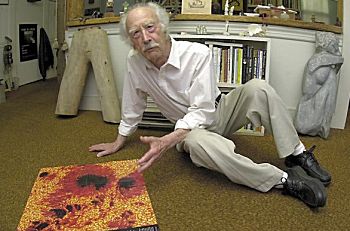
Vincent Ferrini
1913-2007
Photo: Robert Branch
“I live in the unity of word and image. You’ve got to have both”
-
Vincent Ferrini
A full life, shaped by water and words
James Sullivan
Vincent Ferrini: The Initiations
Craig Stormont .....................................................
from
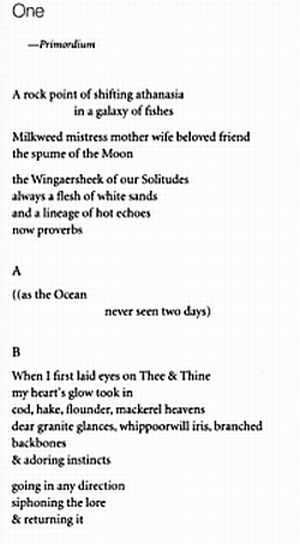
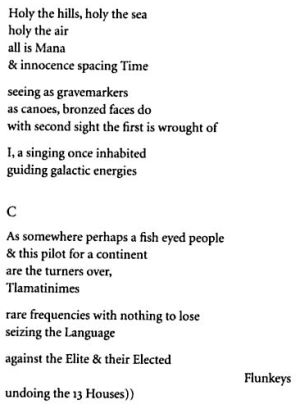
The whole song: selected poems
Vincent Ferrini
google books
_______________________
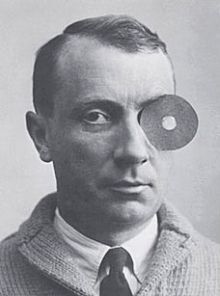
Jean Arp
b. Sept. 16 1886
photograph by El Lissitzky, 1923
.....................................................
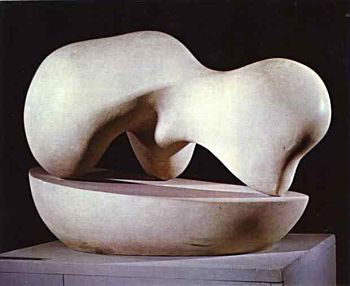
Human Concretion
Jean Arp
1933
Vingt-Cinq Poèmes
Tristan Tzara
Illustrated by Jean Arp
Zurich: Collection Dada, 1918.
_______________________
Another Bletchley Park
Paul Hegarty and Gary Genosko
ctheory
We are so attuned to the vividness of the virtual that the encounter with the crumbling 'National Code Centre' at Bletchley Park seems to accelerate the aging process. The phantasms of Baudrillard's code, the ecstasy of digitality and the caress of the tactical and tactile, violently recede when faced with the dinge and despair of an English suburb and abandoned telecom buildings overrun by weeds and vandalism. That is how Bletchley Park is approached from the train station. ipods and Blackberries go quiet at the sight of boarded-up 'huts' and unimpressive heaps of industrial waste. A vision from Neal Stephenson's Cryptonomicon appears: Alan Turing hunched over reading the RCA Radio Tube Manual exclaiming: forget sprockets, valves (tubes) are the future! Welcome to yesterday. (....)
Let's imagine another Bletchley based on an alternative destiny of secrecy and follow the line of codebreaking. The historical convergence of information theory and secrecy, two concepts that Claude E. Shannon once remarked could not be kept apart, did not result in the surveillance society characterized today by deep packet inspection for the purposes of monitoring and censorship of Internet traffic and manipulation of message content by governments around the world including China, US, and Iran. Instead of a burgeoning cybersurveillance of data intercepts, traffic intelligence gathering, rerouting, rewriting for disinformation, disrupting peer-to-peer communication, and control of encryption resistant to widespread inspection, the hackers really did win the war and full packet encryption became available to and free for all. Codebreaking, then, as an anti-fascist practice and staple of resistant technocultures. The doubled Bletchley we see now will remain a permanent precursor, persisting. The 'other Bletchley' (of now) that mirrors the first (and vice-versa) are a lesson in breaking code through further encoding. Another Bletchley Park is needed now more than ever. ...(more)
_______________________

Swine Flu detail
Glass Microbiology
Luke Jerram
These transparent glass sculptures were created to contemplate the global impact of each disease and to consider how the artificial colouring of scientific imagery affects our understanding of phenomena. Jerram is exploring the tension between the artworks' beauty and what they represent, their impact on humanity.
The question of pseudo-colouring in biomedicine and its use for science communicative purposes, is a vast and complex subject. If some images are coloured for scientific purposes, and others altered simply for aesthetic reasons, how can a viewer tell the difference? How many people believe viruses are brightly coloured? Are there any colour conventions and what kind of ‘presence’ do pseudocoloured images have that ‘naturally’ coloured specimens don’t? See these examples of HIV imagery. How does the choice of different colours affect their reception?
thanks to Anne Galloway at the reactivated Purse Lip Square Jaw
and congratulations on her new position in New Zealand. _______________________
Reaction through the breach
Stan Goff
Feral Scholar
One’s outrage these days can feel like you’re trying to drain the ocean a cup at a time. You get very tired, but the ocean seems to take little notice. So I spend far less time riveted to what passes for news. It’s a self-care imperative.
But there is a belly-bug going around, one that begins with nausea that lasts for a full day and winds up with a couple days of abdominal cramps that break you out in sweats and curl you into a fetal position. It hit me three nights ago, and on day-two I said to hell with this and scrounged up an old bottle of Vicodin the doctor had prescribed last year for an inflamed gall bladder. Within about 20 minutes, my stomach being empty, the opoid started to turn down the volume on the belly pain, my muscles released the tension I had been unaware of, and I became a kind of flaccid, supine, passive receptor – perfect for tv. So I channel-surfed and popped Vicodin for two days until this morning.
I re-discovered two things: cable television is creepier than a Hieronymus Bosch painting of Hell, and the latent reactionary current of American politics is actively and effectively self-organizing. People will say I’m nuts – some already do – but if you haven’t been watching tv, especially that crap they call news, then you ought to start. It’s the semiotic conduit that is being used to energize this reactionary self-organization… even when it’s pretending to be highly critical....(more)
_______________________
Here's what corporations know, but don't want you to find out: Private insurance is for suckers. Armies of healthcare industry flacks, lobbyists and bought-and-paid-for legislators rant that nonprofit, public insurance is a slippery slope to socialist hell, will limit your choice of physicians to Doc Watson and Dr. Kevorkian, and bankrupt the country. But, in fact, most U.S. Fortune 500 companies wouldn't touch private insurance with a 10-foot colonoscope.
- Terry J. Allen
_______________________
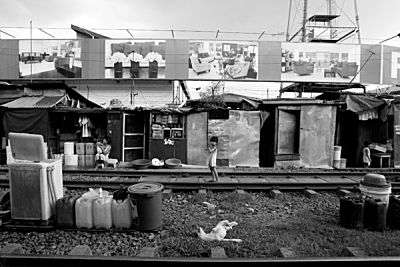
Bankal settlement with billboards
Makati City
Squatter Settlements In Metro Manila
Neal Oshima
Urban Landscapes
_______________________
An Evening of Breath
Laura Carter
post-dérives
Tired of dead economic tropes,
I went in search of lake
with a waiting king
pooling blood into the old graves---
listen to this
letter removing itself from
a familiar
friend’s desire for the polis to be cut from the law.
I am there,
too, wearing the body of the nine
thousand things, government absolved
and put behind bars for the time
being, the crux of the antinomy glanced at
and moving like a spider in a cool web.
...(more)
_______________________
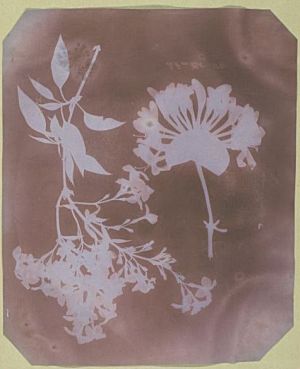
Two Plant Specimens
1839
William Henry Fox Talbot
1800 - 1877
1 2
Records of the dawn of photography: Talbot's notebooks P & Q
google books
The Photographic Art of William Henry Fox Talbot
Larry J. Schaaf
reviewed by Lyle Rexer
Art in America, Sept, 2001
William Henry Fox Talbot - The Almost Founder of Photography
Annette Labedzki
William Henry Fox Talbot and the Invention of Photography
The Metropolitan Museum of Art
_______________________
Watching Cut Flowers Die
Louis Armand
The stillness is so quiet here. Decades
pass before you wake
like space-flight
into the outer limits. I write down
everything in books—
mind a little too blank sometimes
staring into white. Nowhere places.
You lie there naked and wait—
listening to dust settle
on your inner eye. I also
communicate telepathically
with birds and mice. There are
machines to keep watch.
A garbage truck
undoing the secret arrangements of trash
in the middle of the night.
A very cold clear night inside
your idiot madness—
< sorting the dark matter from the light.
Two Poems
Louis Armand
Shampoo 36
|
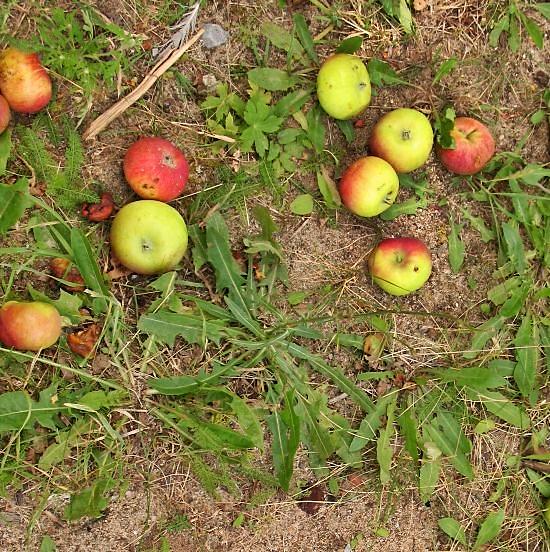

 Janus Head
Janus Head

 The Age of Briggs & Stratton
The Age of Briggs & Stratton





























































